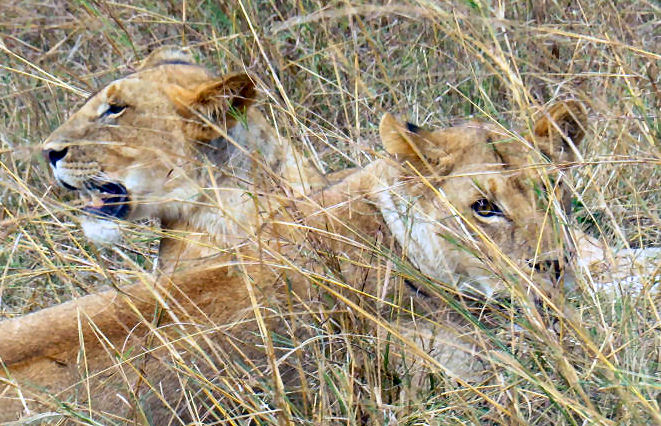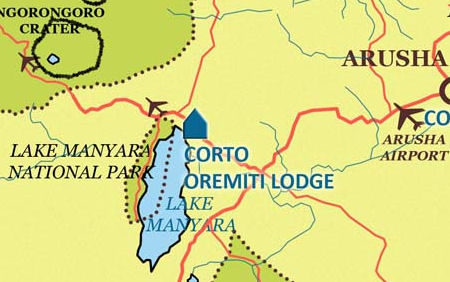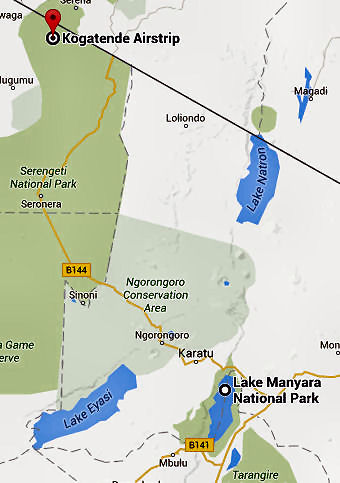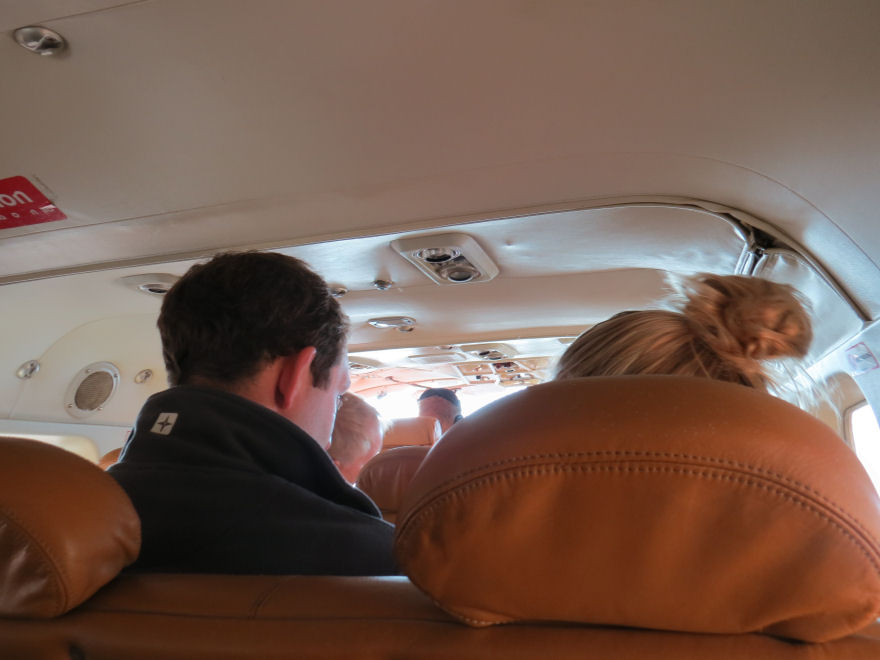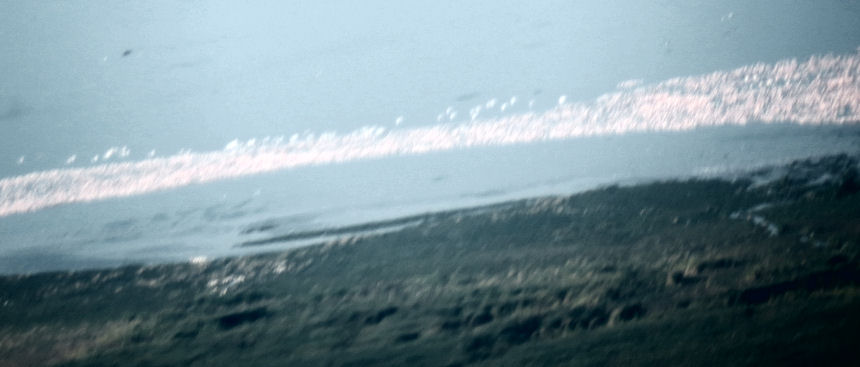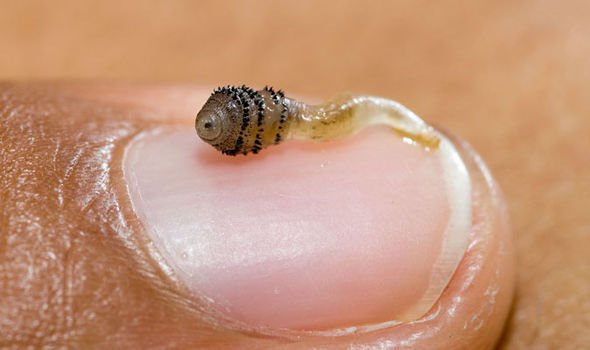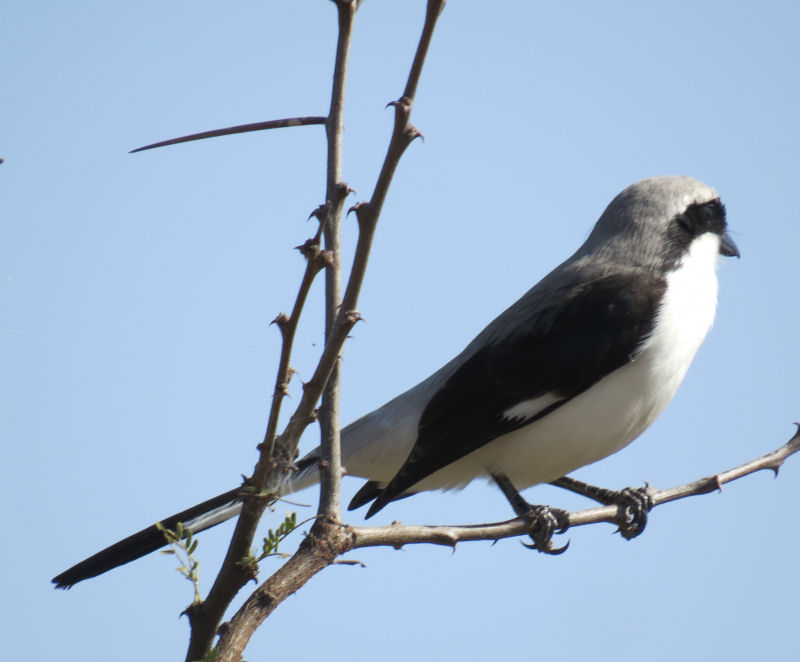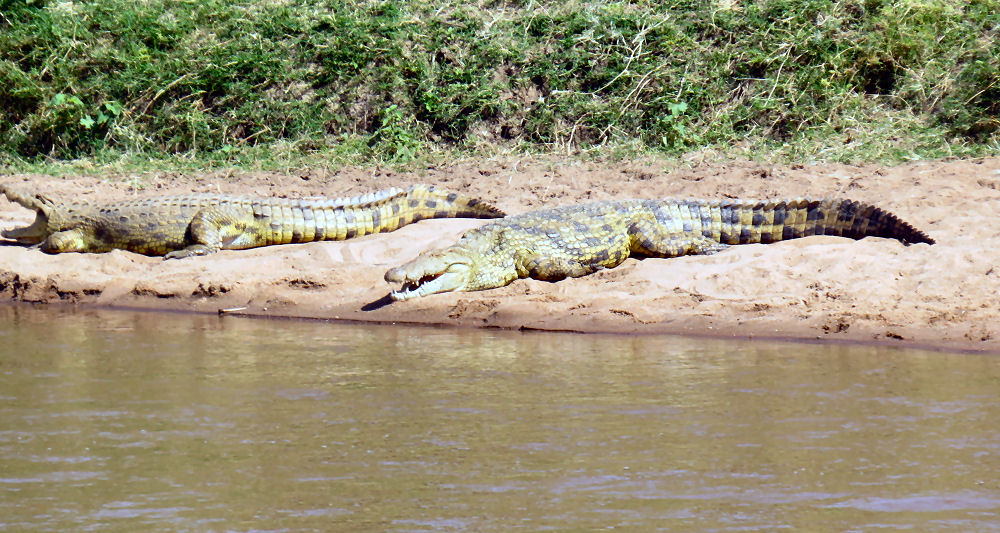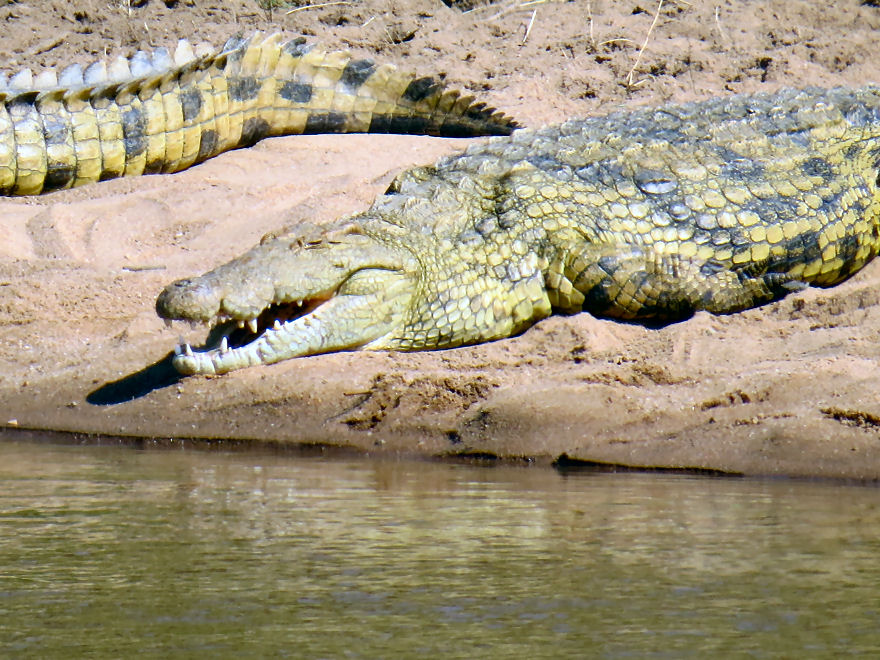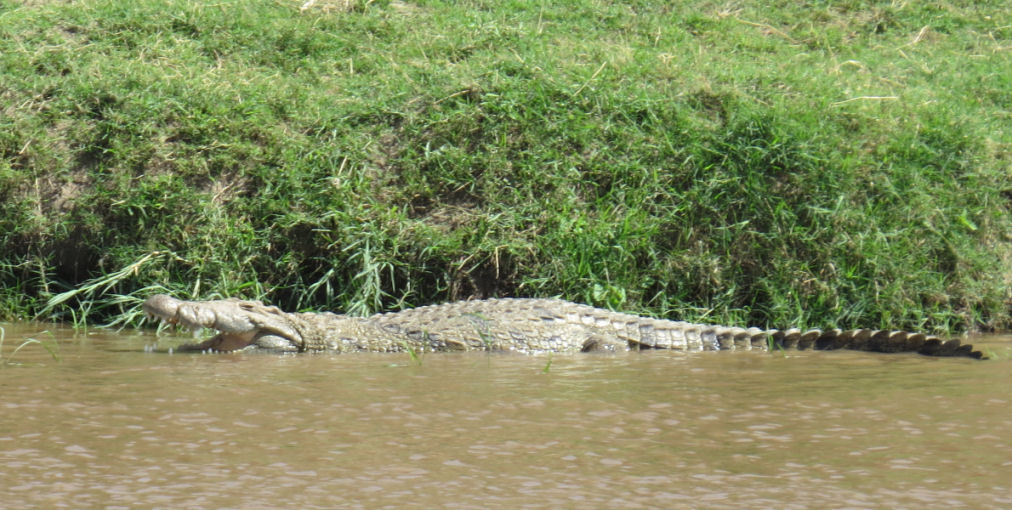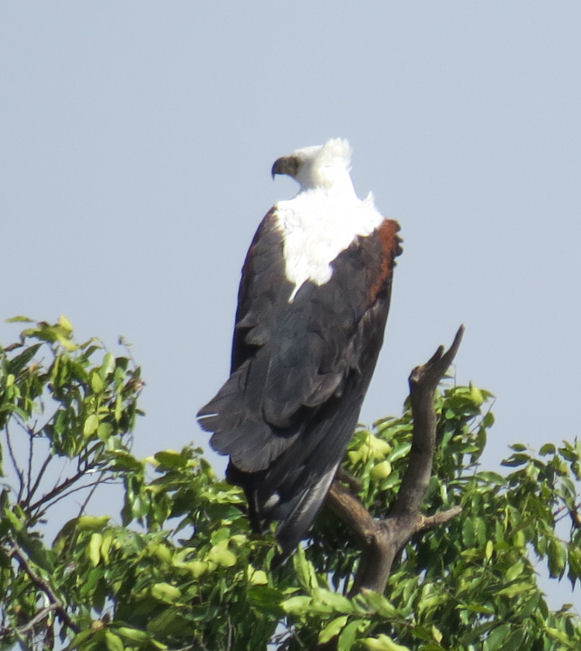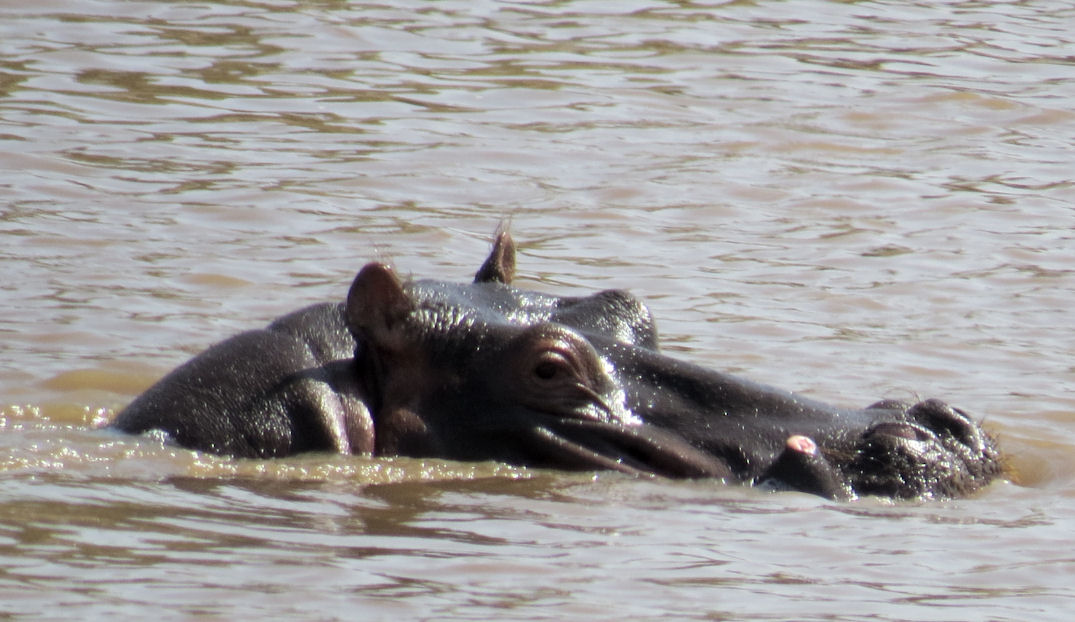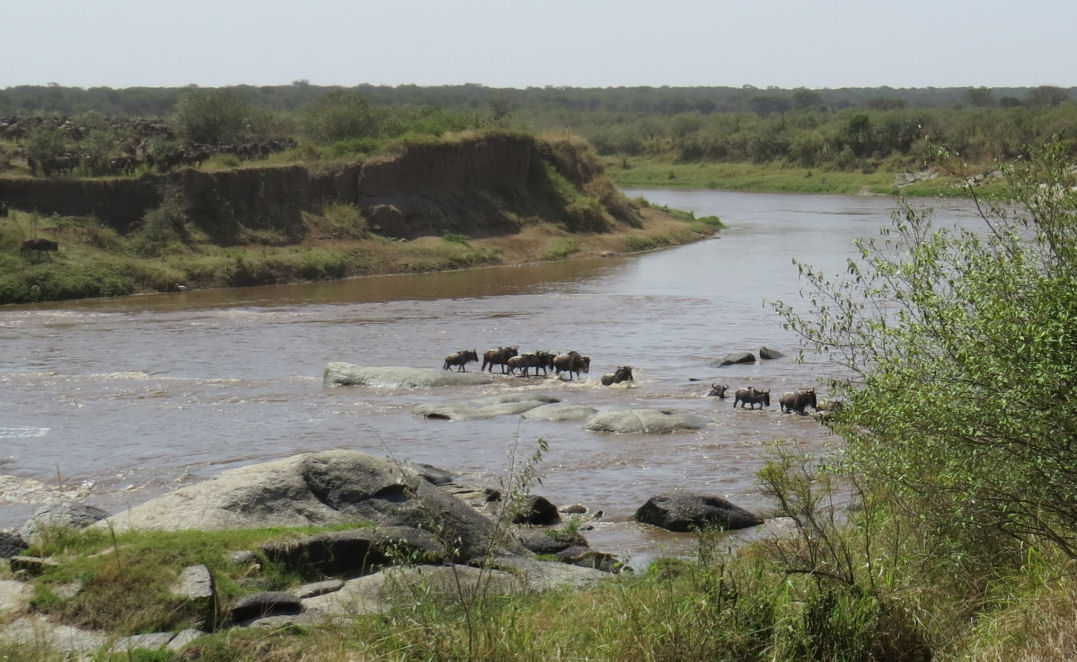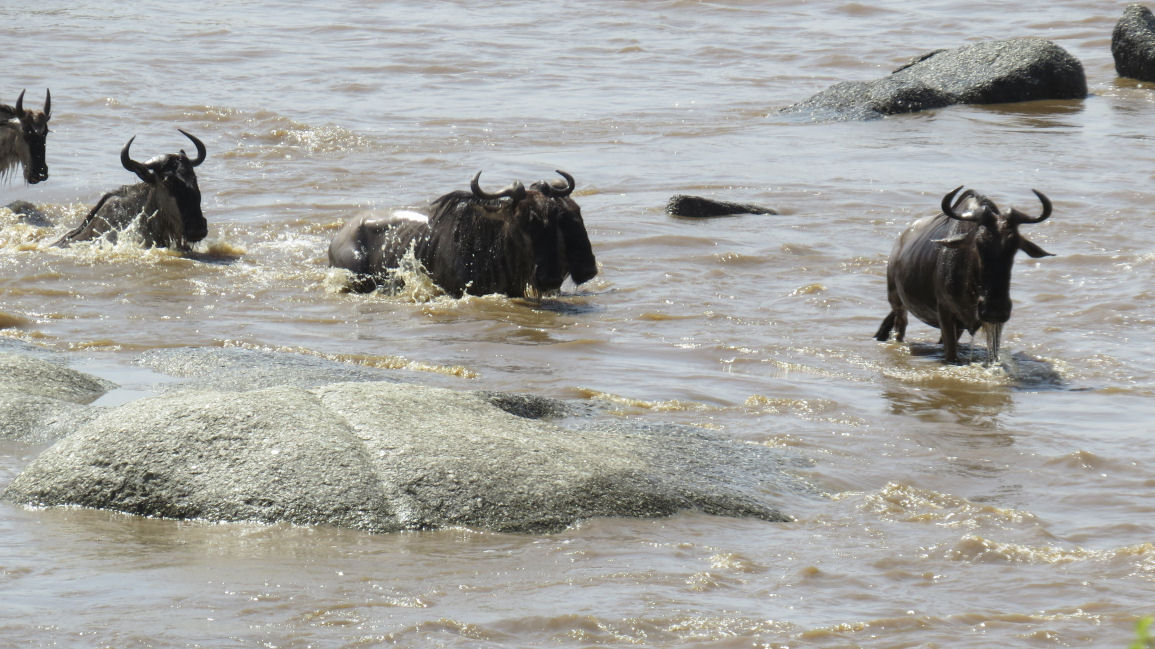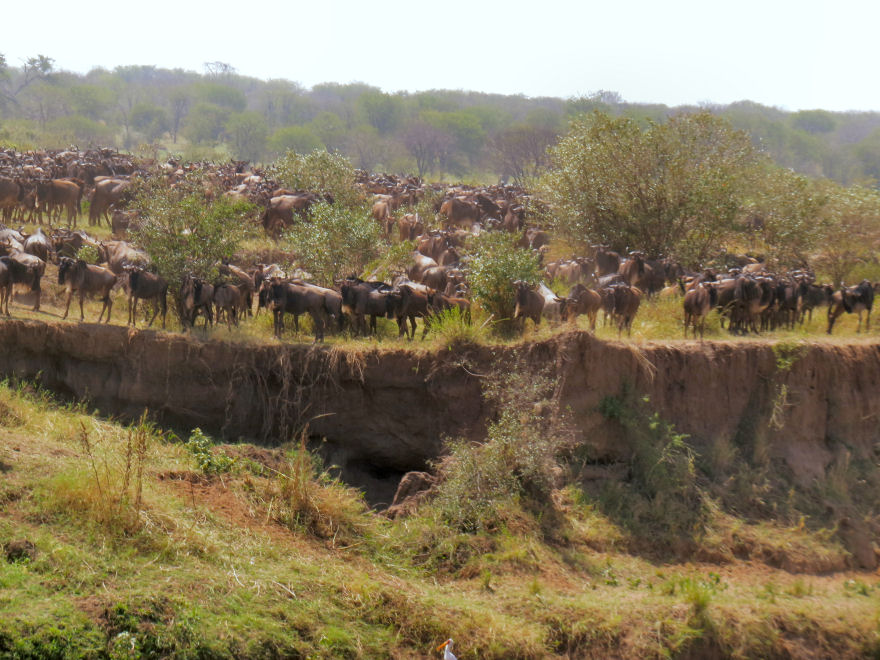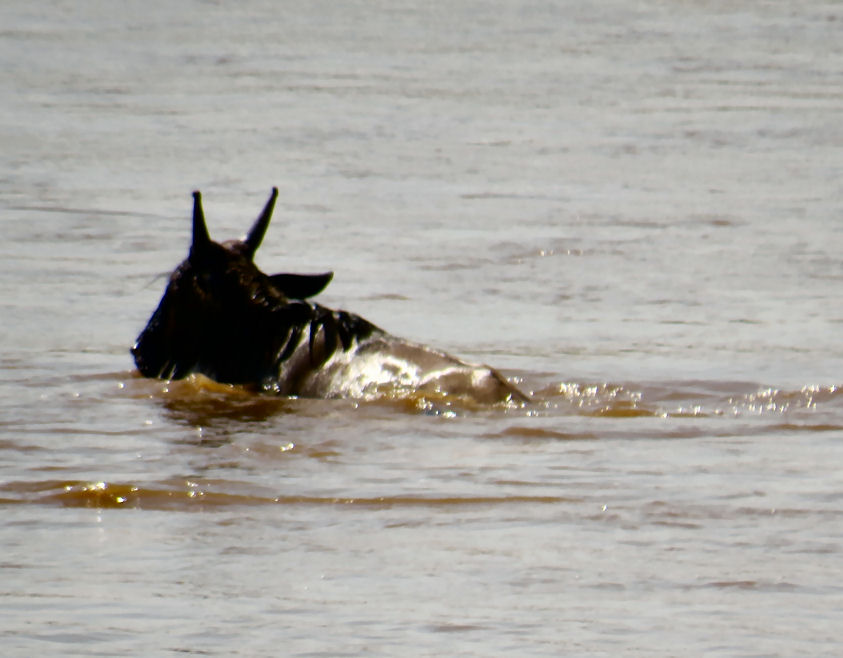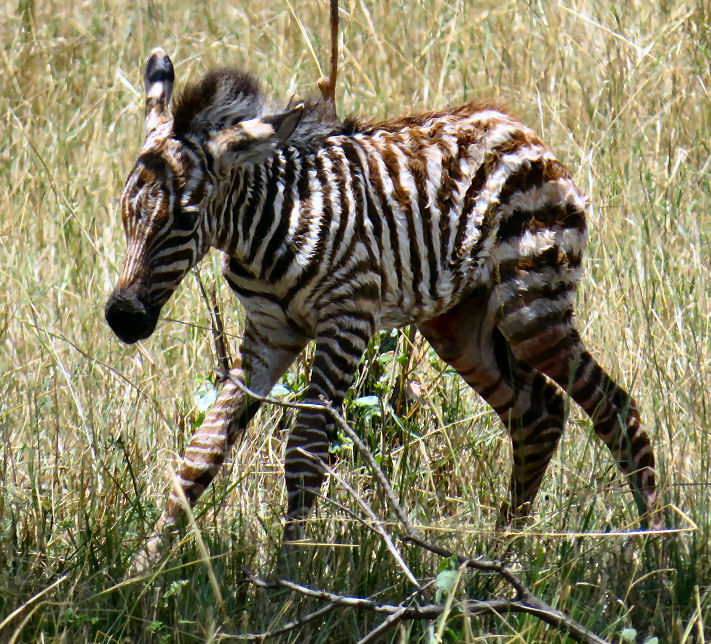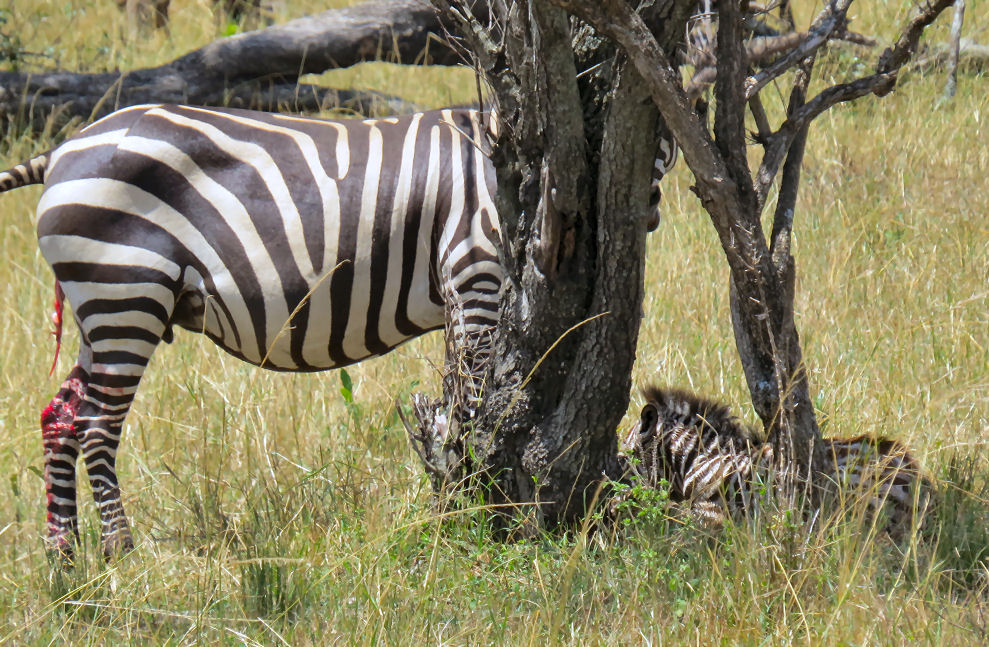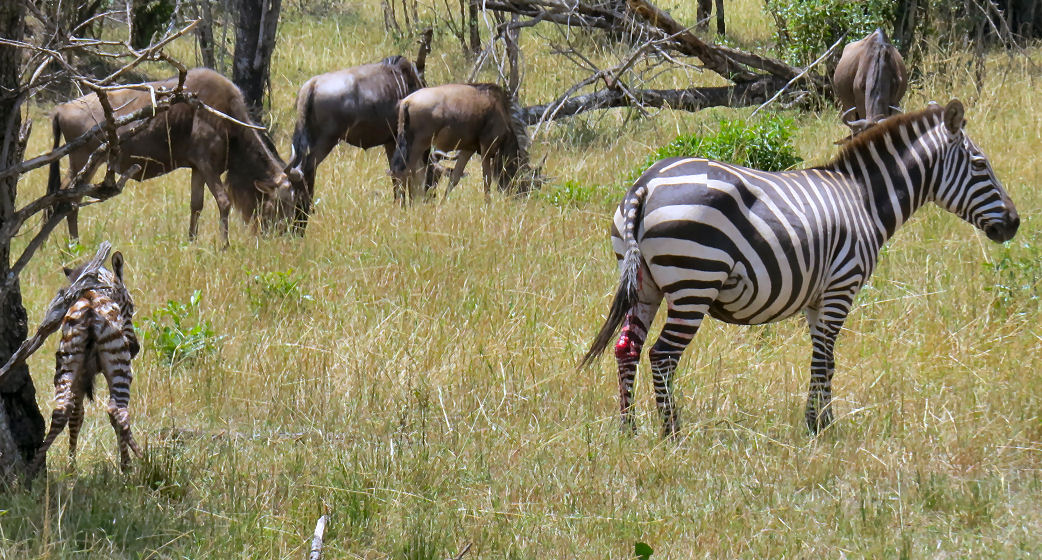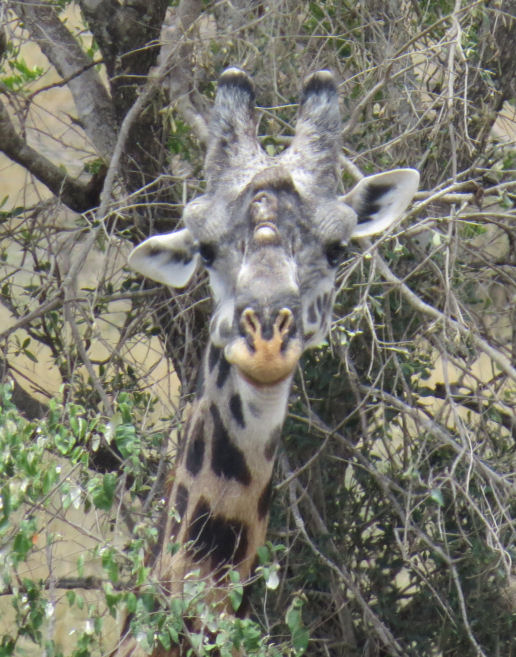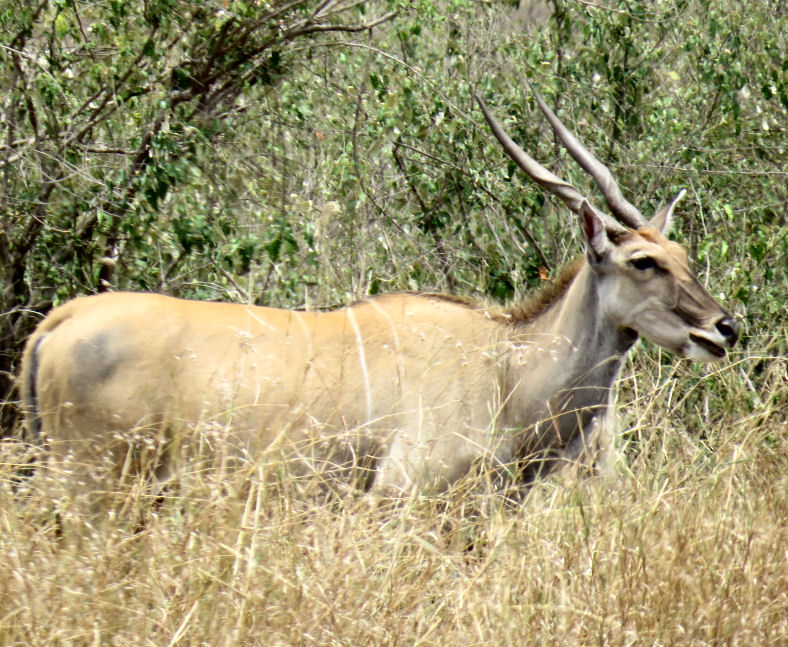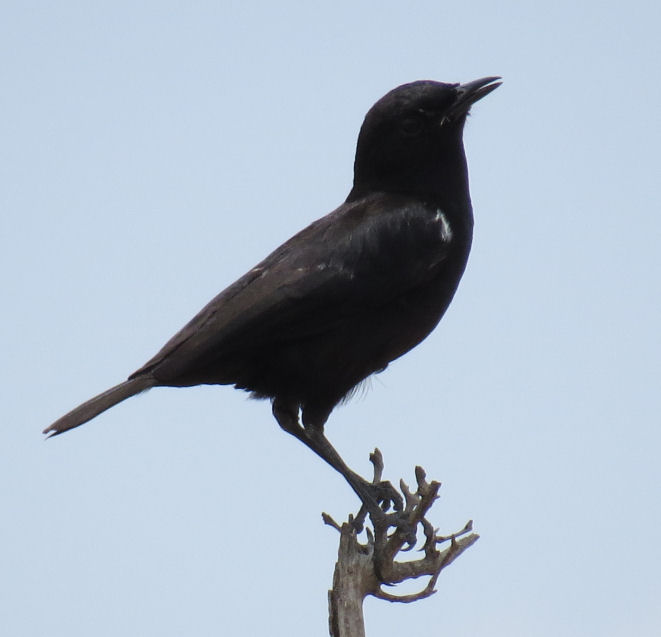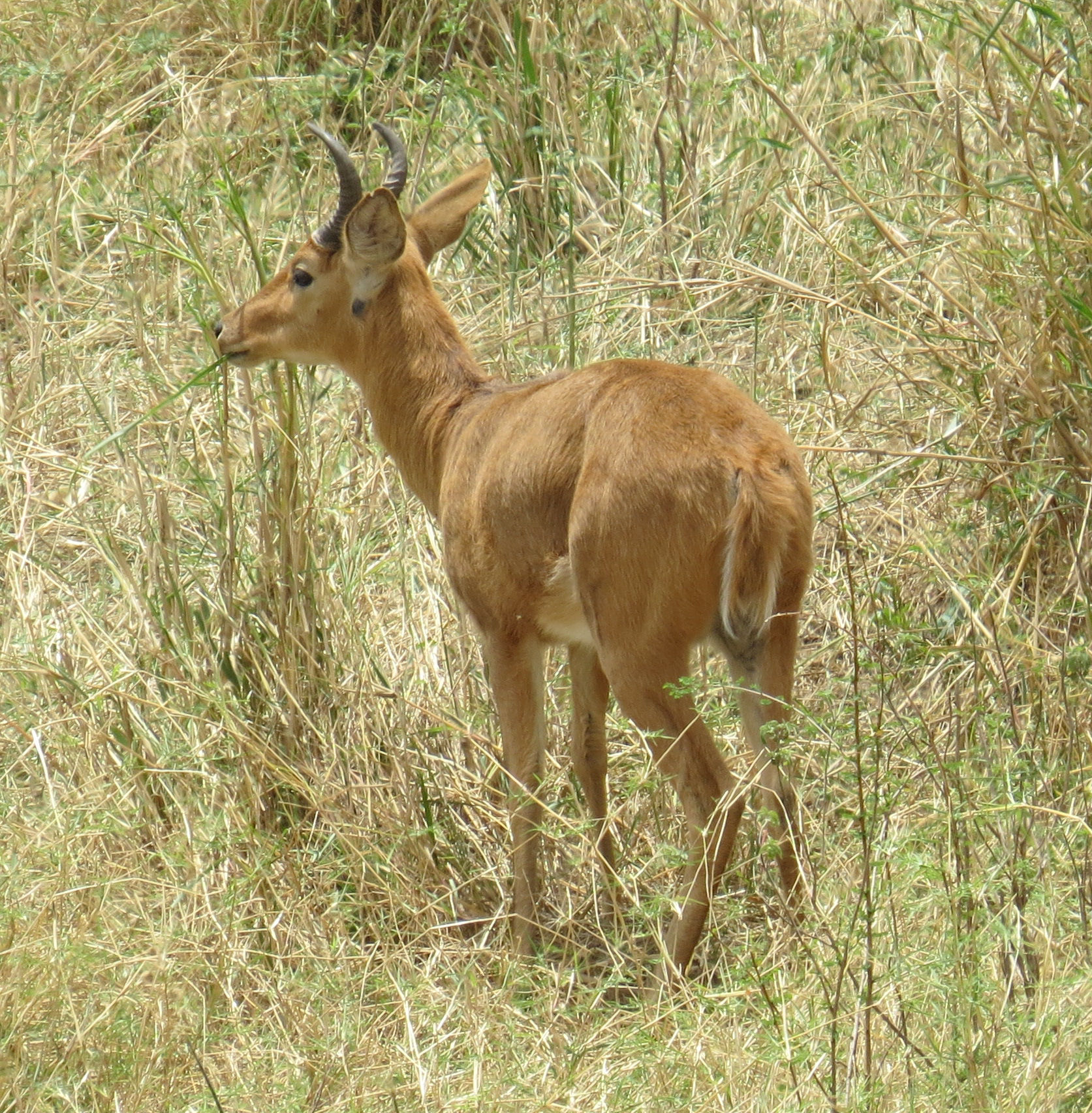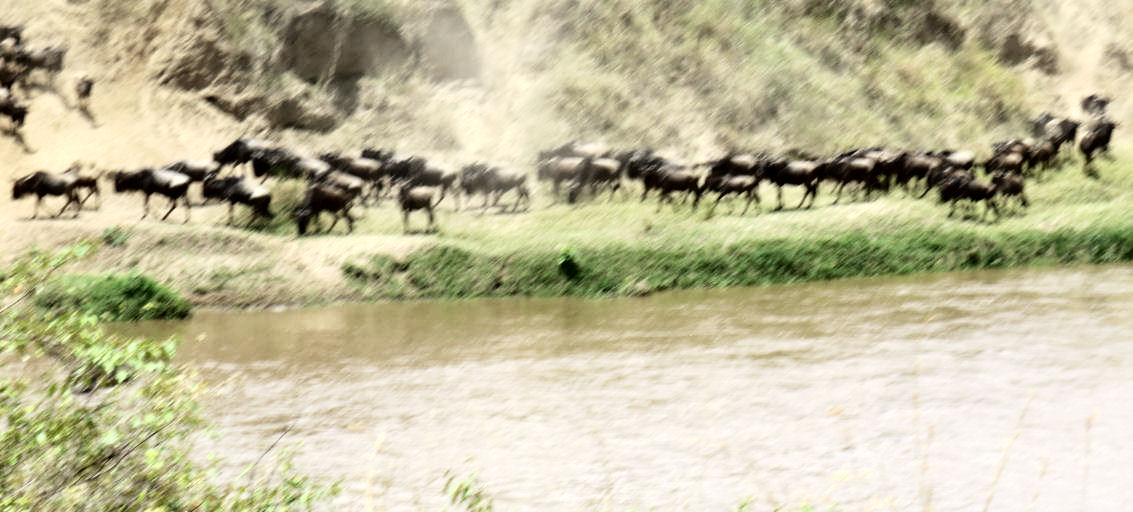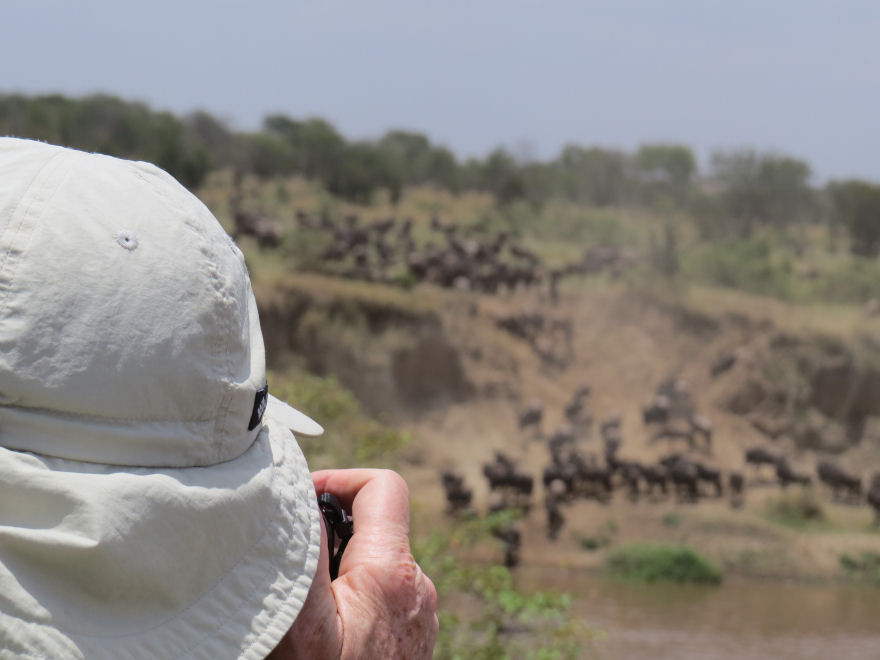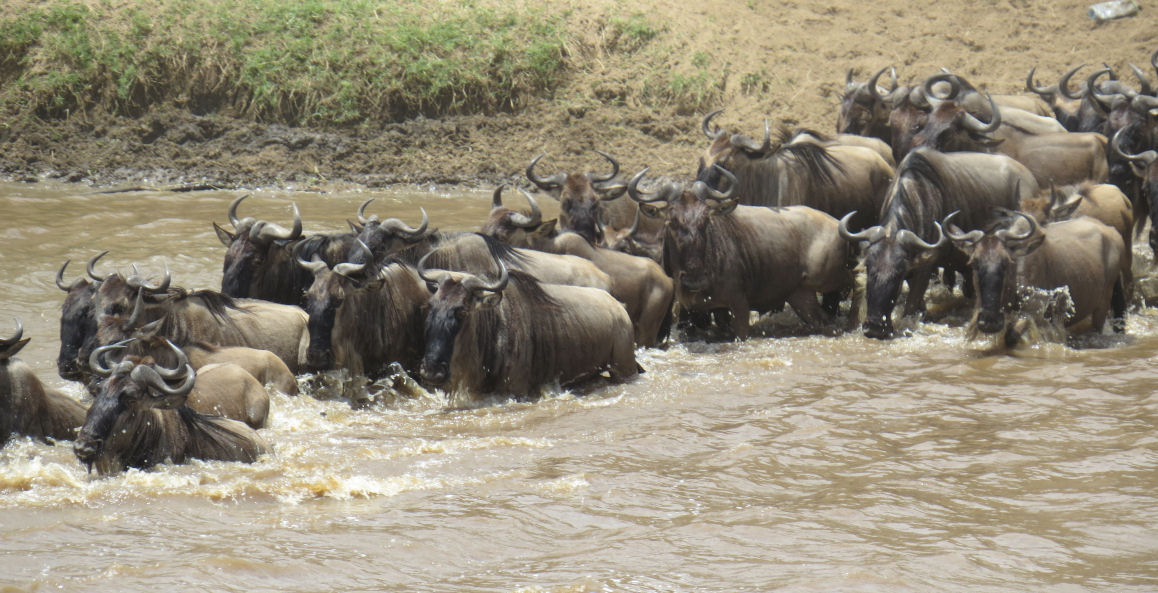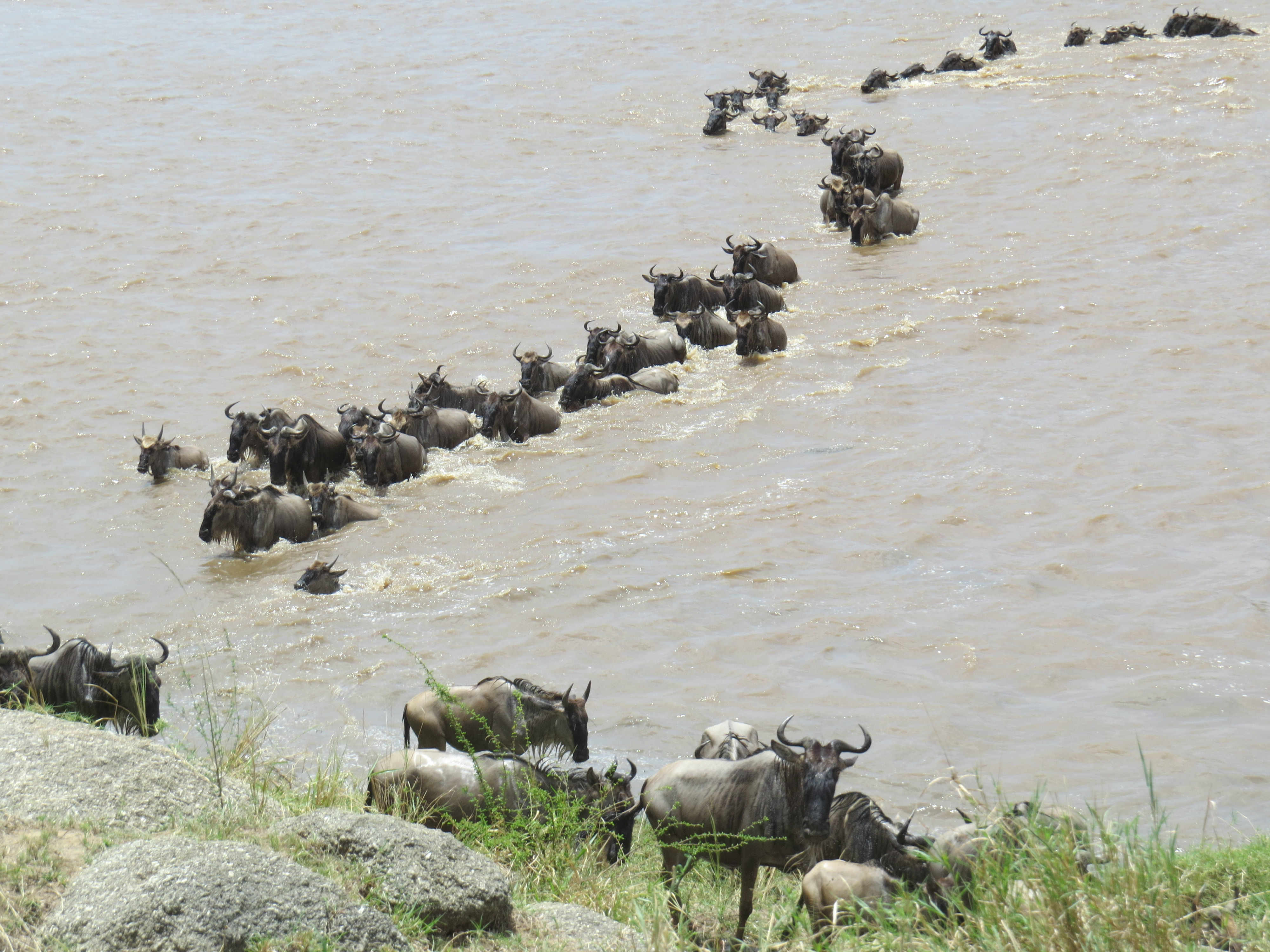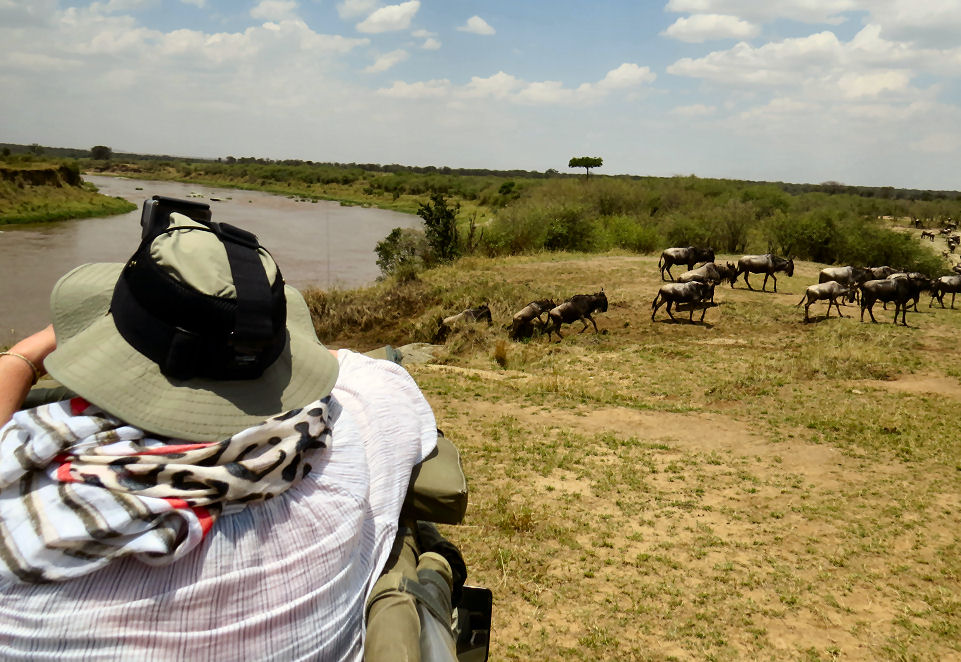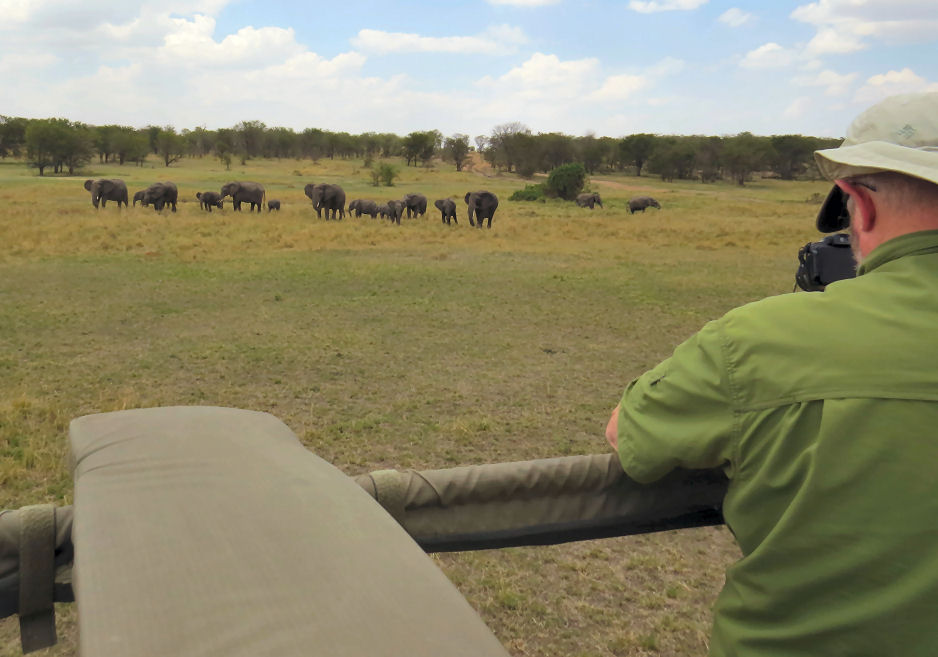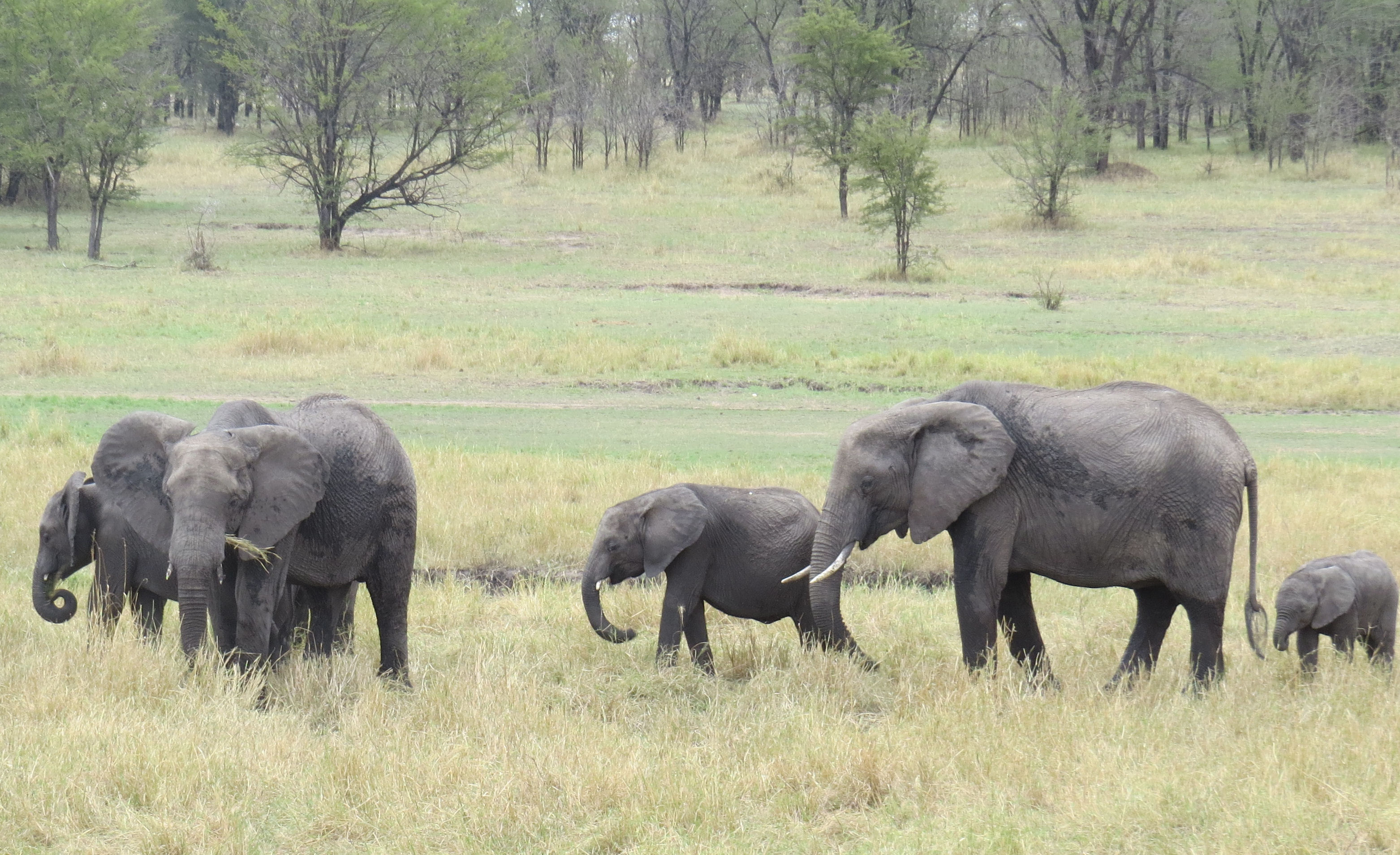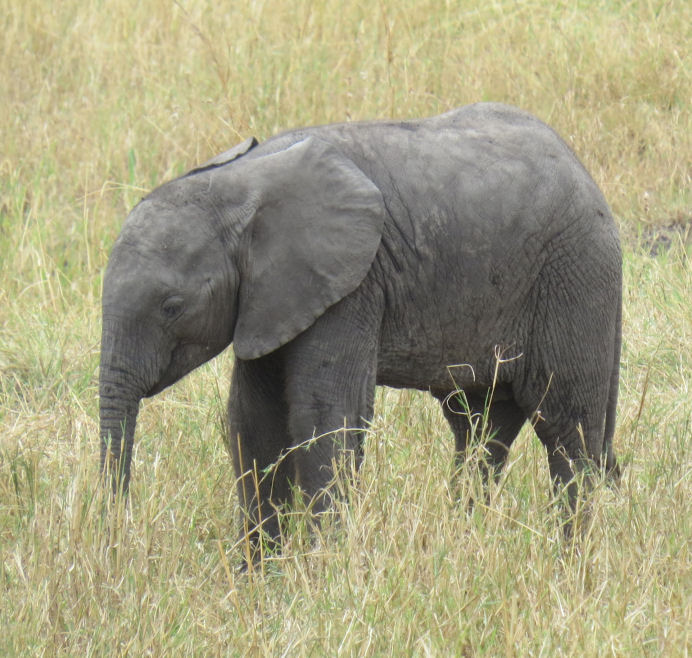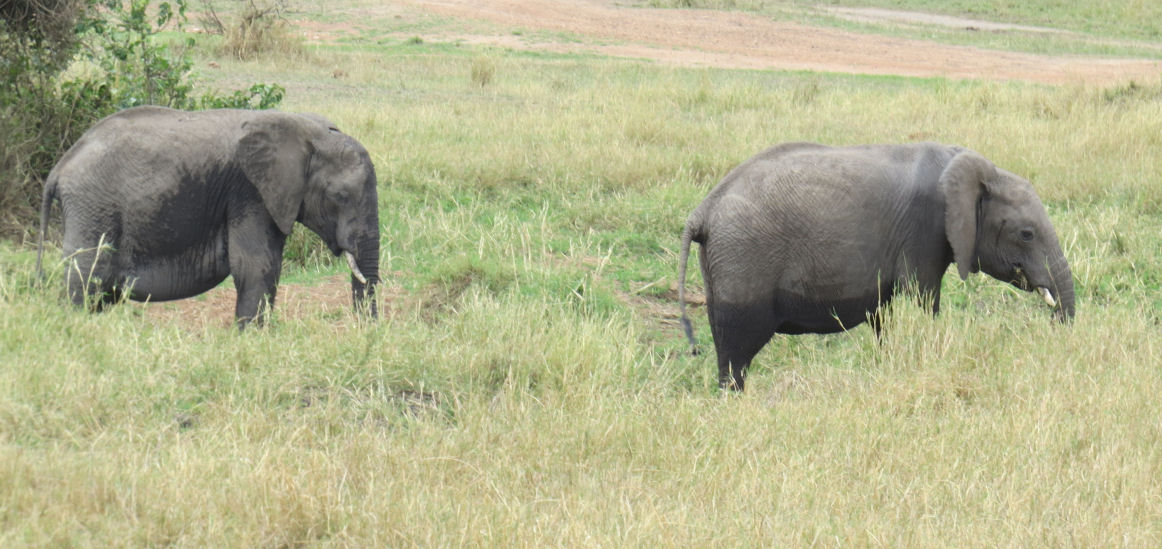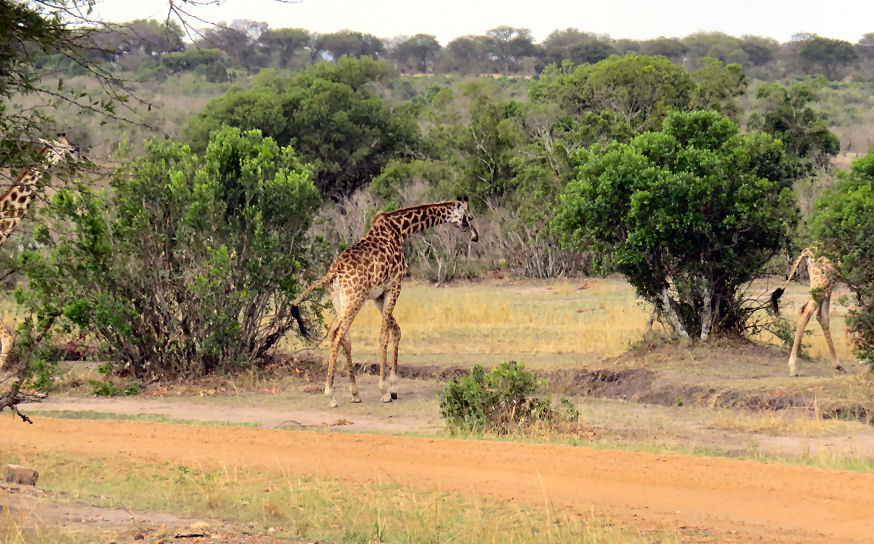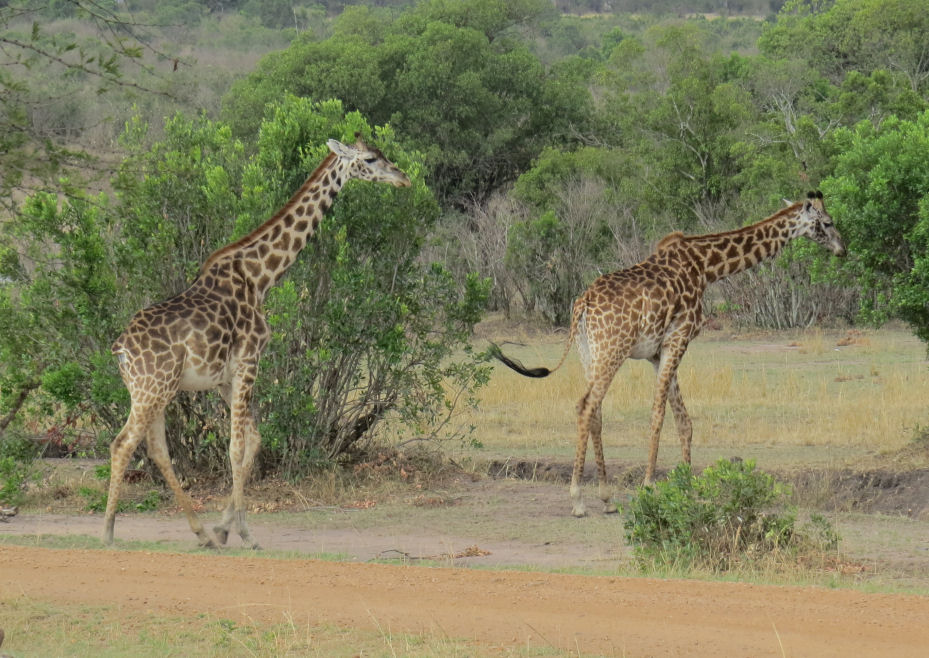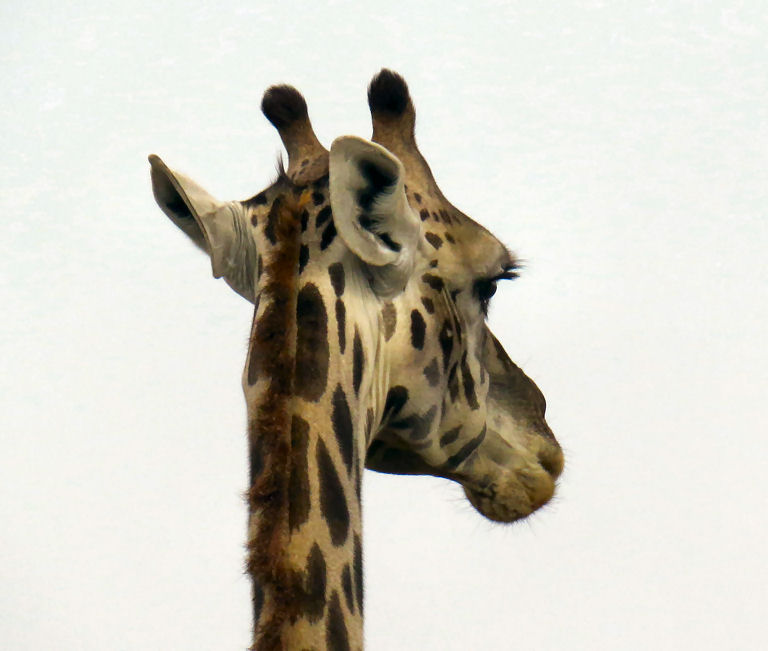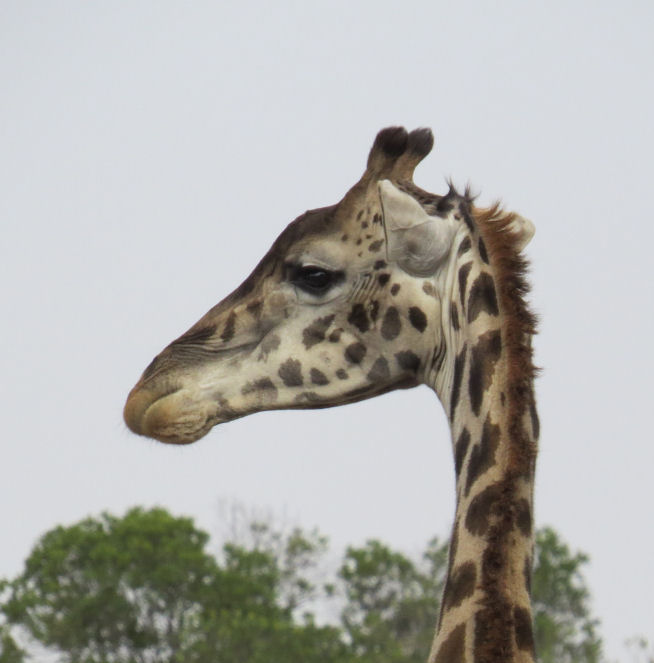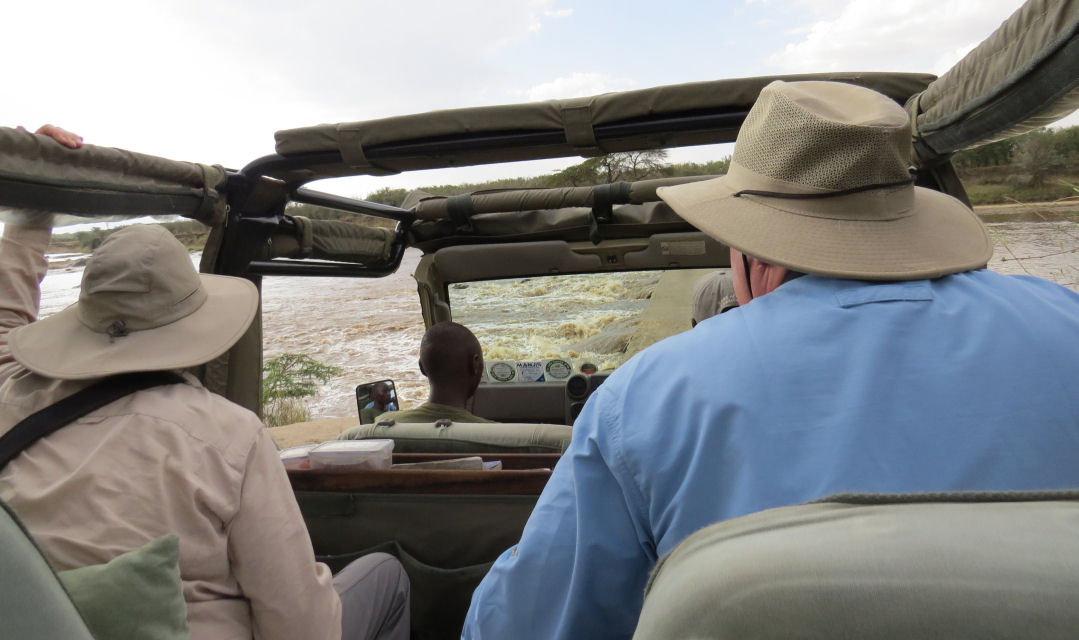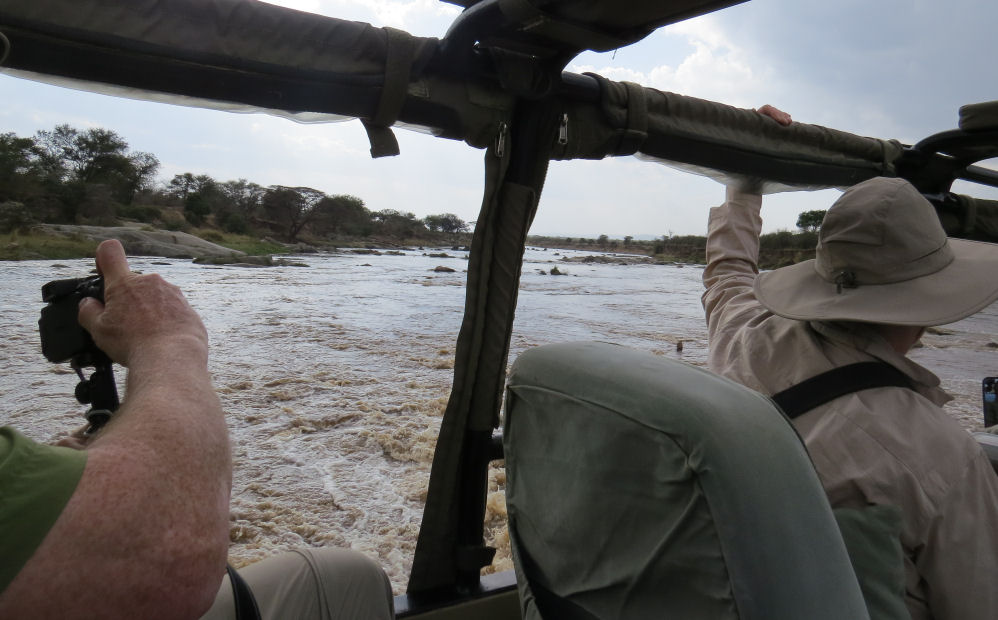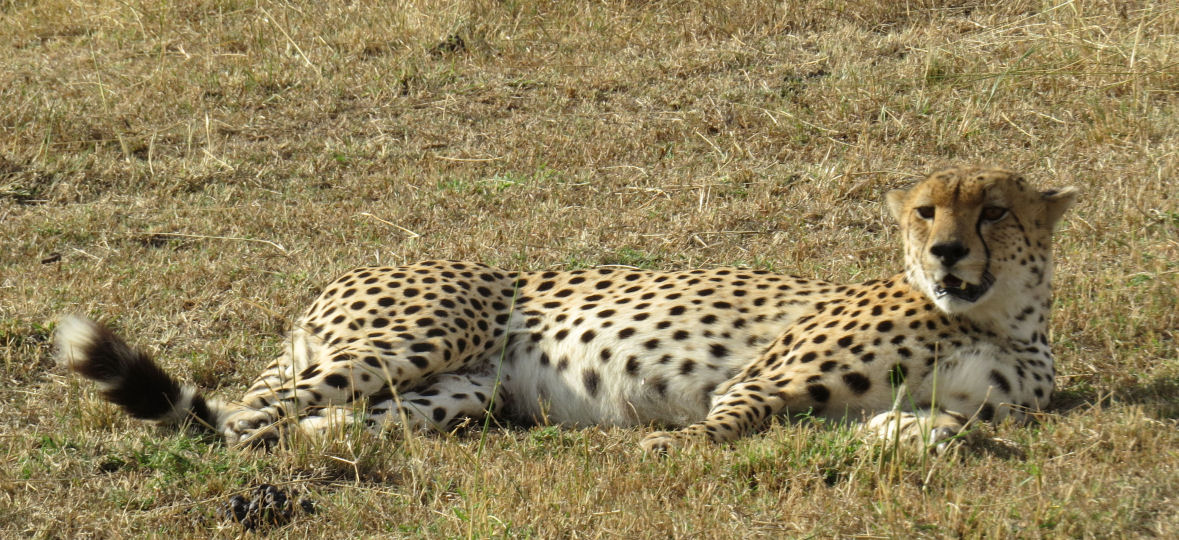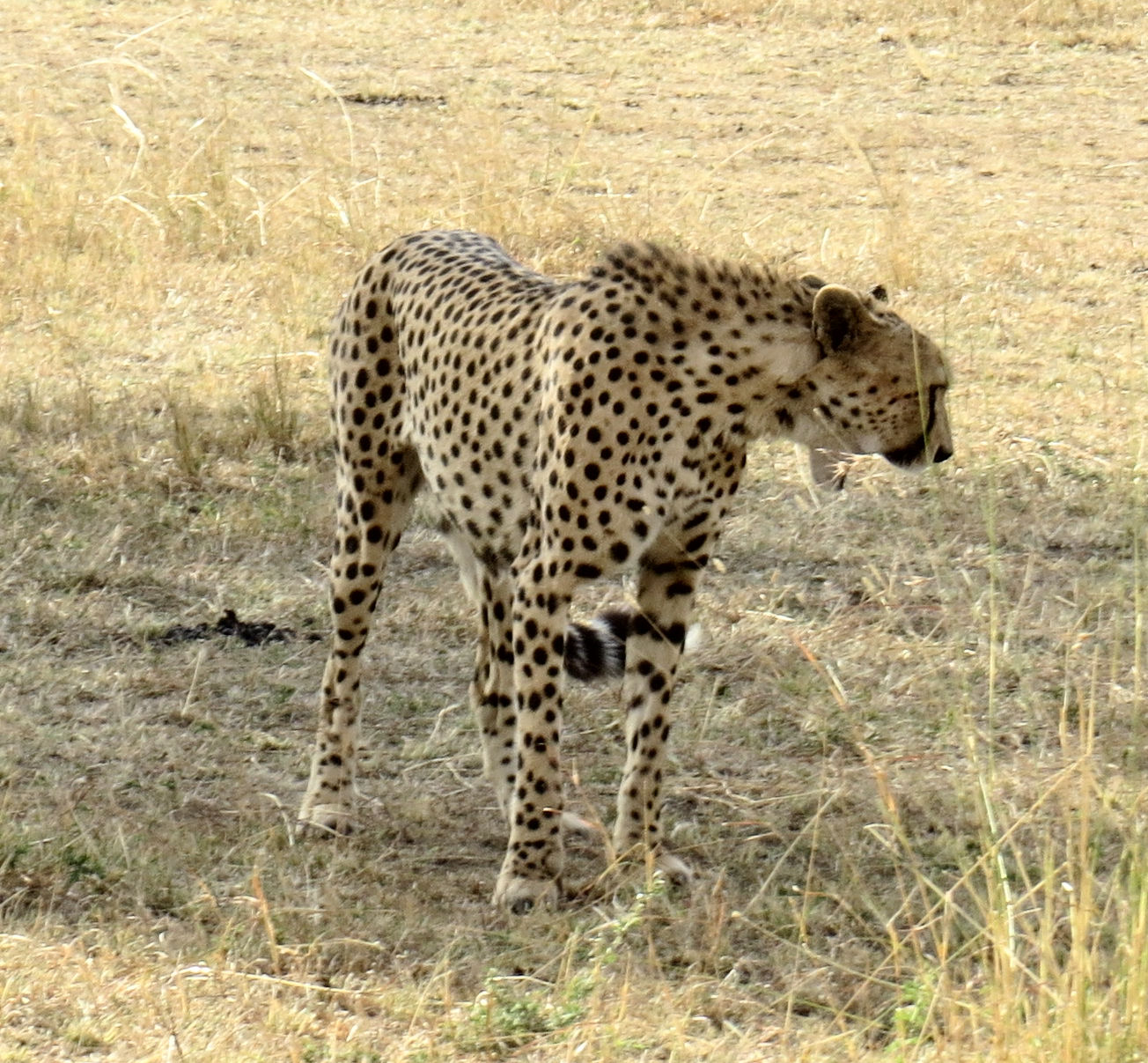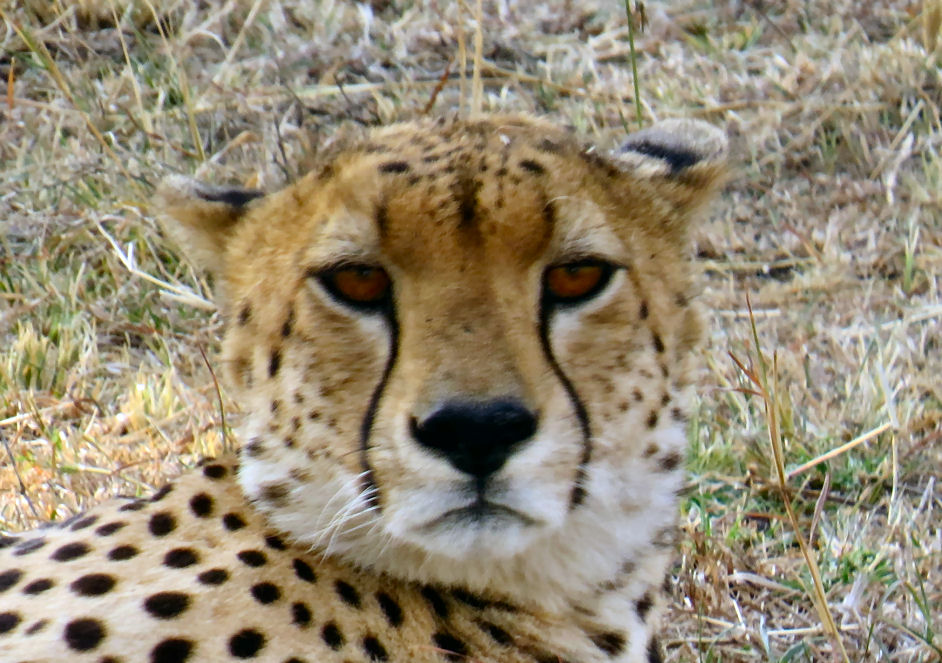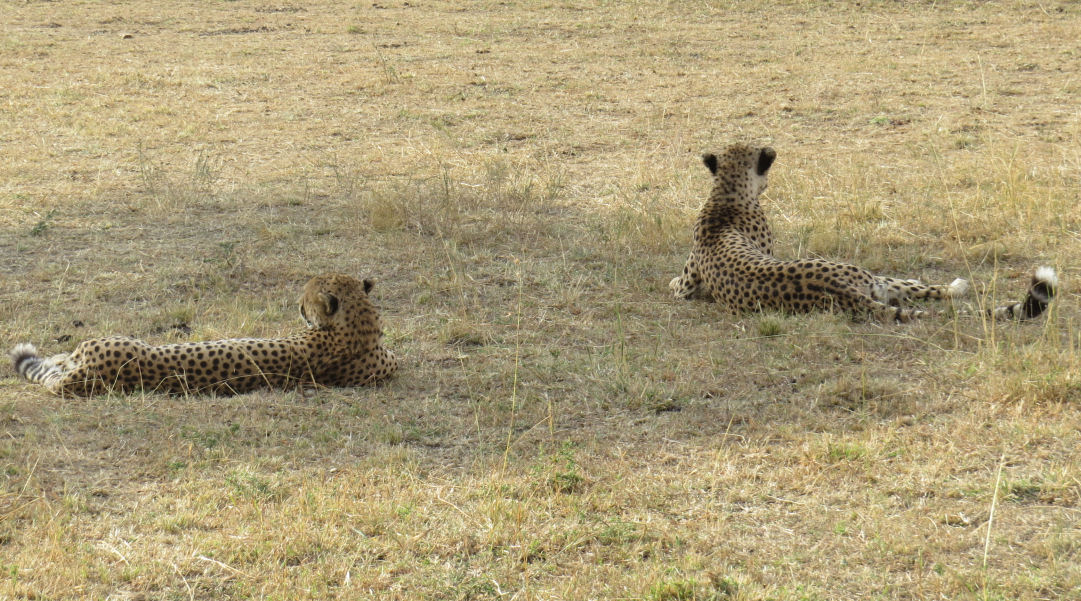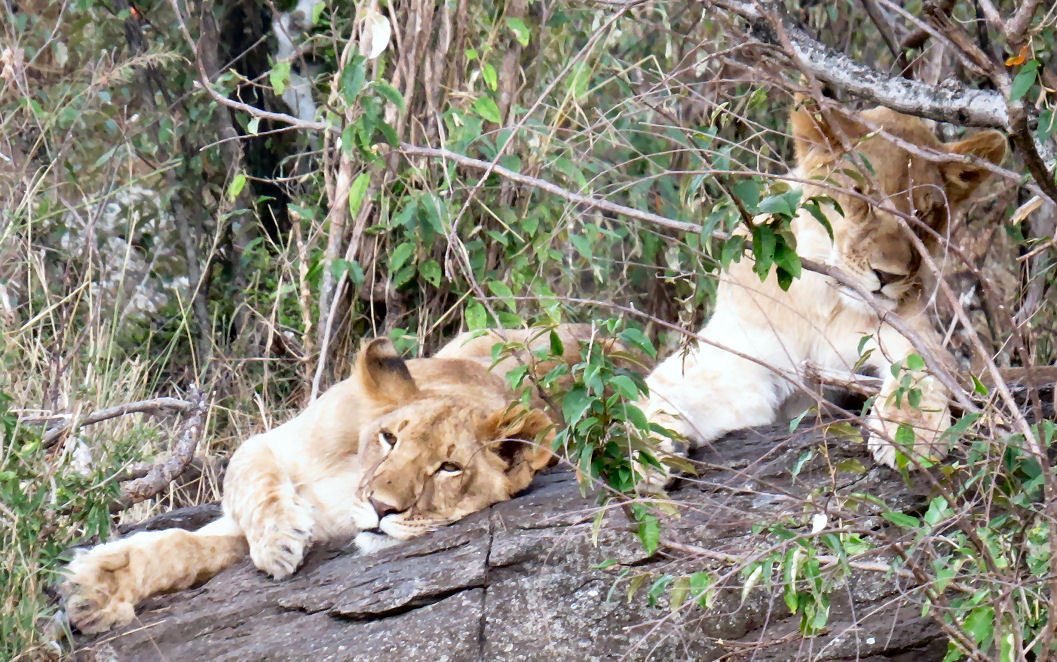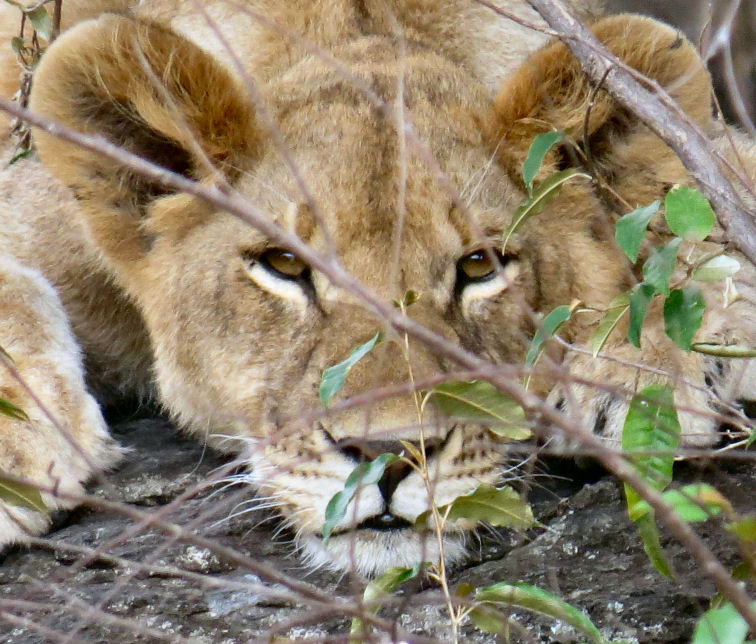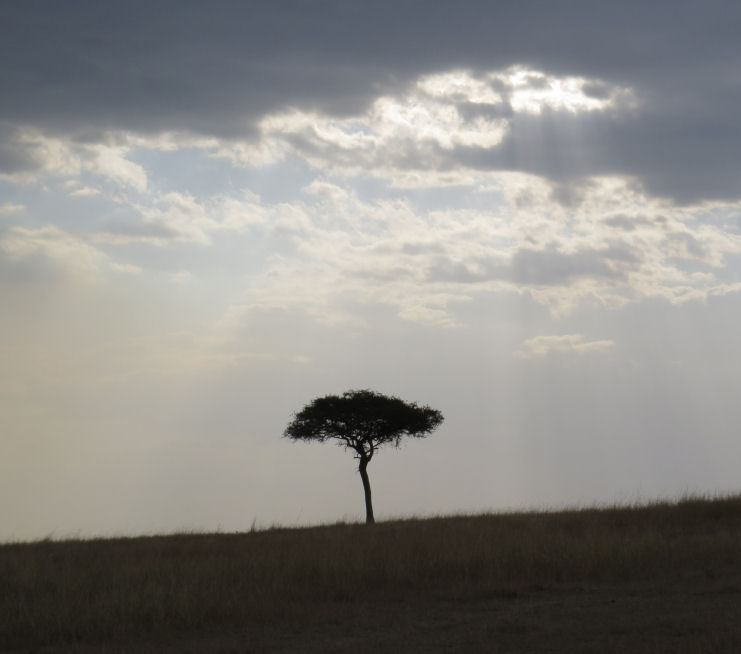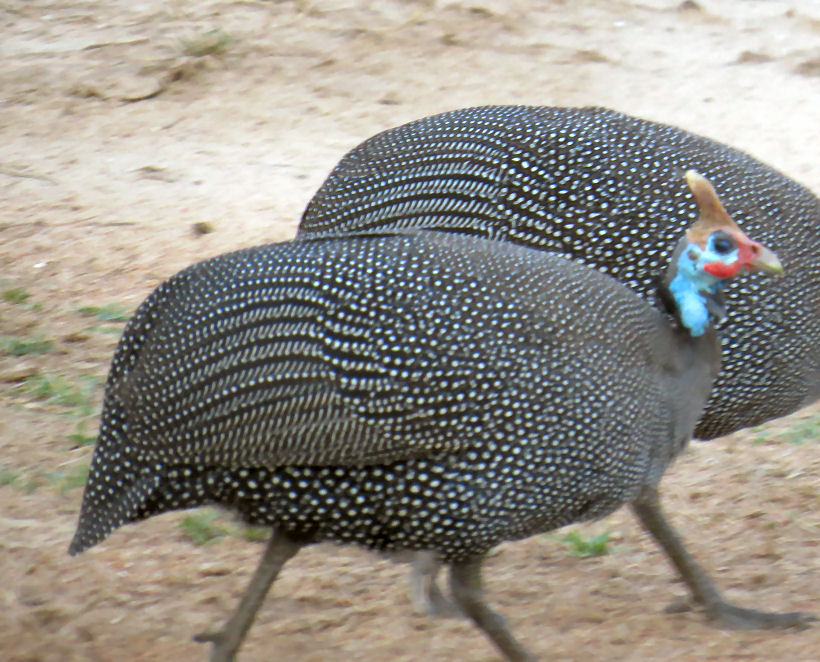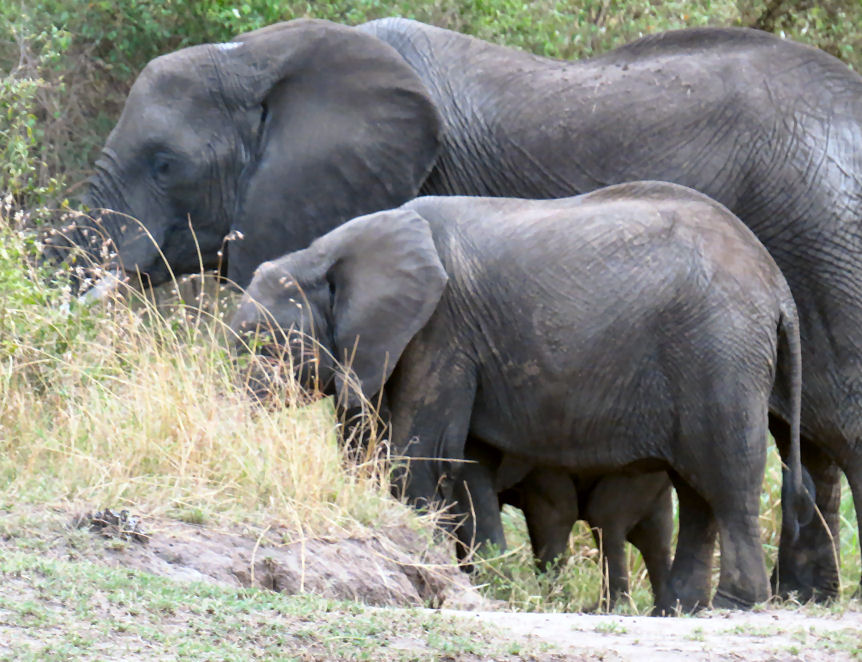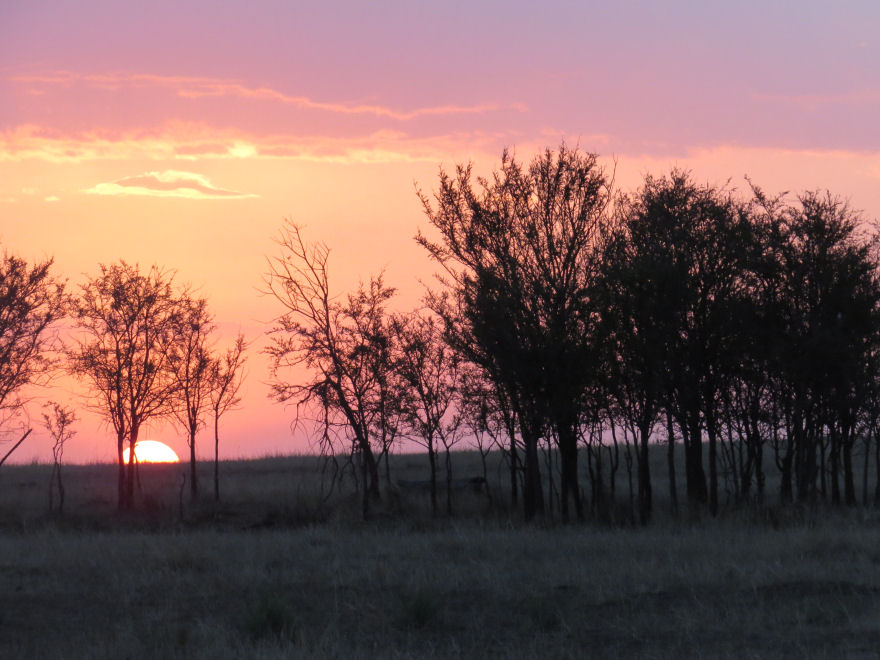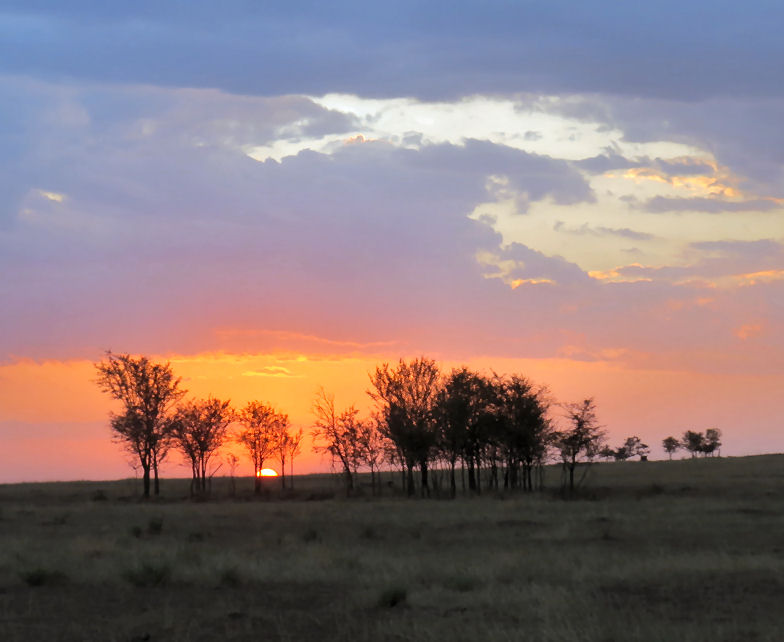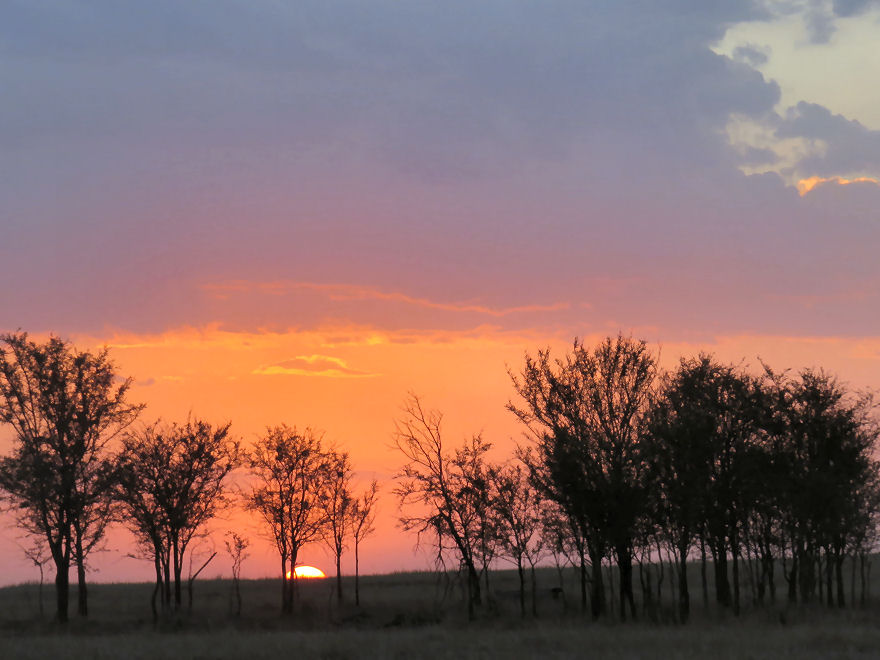We awoke at 5 a.m. so that we could eat breakfast, pack up, and drive to the Lake Manyara Airport in time for our flight on Coastal Airlines, which, according to our itinerary, was scheduled to depart at 7:55 a.m. I felt quite a bit better than on the previous day. Maybe the Cipro was doing its job. I took my morning pill. At breakfast I even ordered eggs over-easy. They were not the best, but they were certainly edible.
On the way back to the Farmhouse I counted ten cats sitting outside the kitchen.
Sue and I got all of our stuff together and packed our duffel bags. I wore my heavy boots rather than my sneakers in order to minimize the weight of my luggage. Staff members from the Plantation Lodge lugged the bags down to the parking lot for us. I checked out, assured the employee at the desk that we did not have a bar tab, and deposited a tip in the tip box.[1]

Jackson was waiting for us, and all of our gear was already loaded into the back of the Land Cruiser. We were all ready to go when someone from the hotel insisted that someone in our group owed money for drinks. It wasn't Sue or me; I was quite sure that the beer that I had two nights earlier had been put on Tom's tab, and Sue had no drinks at all. It turned out that both Tom and Betty realized that they had not paid for some of their drinks. They quickly coughed up what they owed, and we were on our way.
There was not much new to see on the drive to the Lake Manyara Airport, and everyone was rather tired and quiet. We arrived at the airport a few minutes early. I gave Jackson the envelope, and I informed him, in all honesty, that he had saved my vacation. He seemed a little taken aback by this, but he smiled broadly. Betty had spent the night composing her critique of the tourists, and she read it aloud to Jackson. I suspect that he was embarrassed, but he thanked her.
The Lake Manyara Airport was a rather interesting place. The parking area was between two buildings. In one of them local merchants peddled their goods. The other side was a terminal of sorts. I snapped a photo of the terminal, but, for some reason, not the retail area. Since there were no planes there when we landed, we realized that we had some time to kill. I was more than a little surprised to see someone with a rifle dressed in fatigues. We had no way of ascertaining whether he was protecting us from lions or from terrorists.
As soon as our feet touched the ground in the parking lot, one of the merchants attempted to interest us in his wares. Jeff was the only one from our group in the buying mood, but he first consulted with Jackson concerning a negotiating strategy. Jackson estimated that about 75 percent of the asking price would be a reasonable amount to pay. Jeff successfully completed the purchase of some textiles.
We milled around for an hour before the plane landed. We all wondered whether we would be an hour late reaching the Kogatende airstrip. When he plane finally arrived, we went through the security check. The "Departure Lounge" had one x-ray machine and one personal scanner. None of us had any problems, which surprised us a little; Sue's artificial knees usually set off the scanner's alarm.[2]
Our pilot checked our names against his list, but no one weighed our luggage. We boarded the plane along with six other passengers. There was no beverage service, but you could help yourself to a chilled bottle of water. The pilot introduced himself, and then he gave the safety briefing. "This is the front; you came in the back. Please wear the lap belts; don't worry about the shoulder harnesses."
Our first bush flight was rather routine. From the air we could see Lake Manyara and just barely make out the thousands of flamingoes therein. We flew over Ngorongoro Crater, but, as expected, it was still full of its morning mist. There was a little turbulence, but it did not bother me or anyone else.
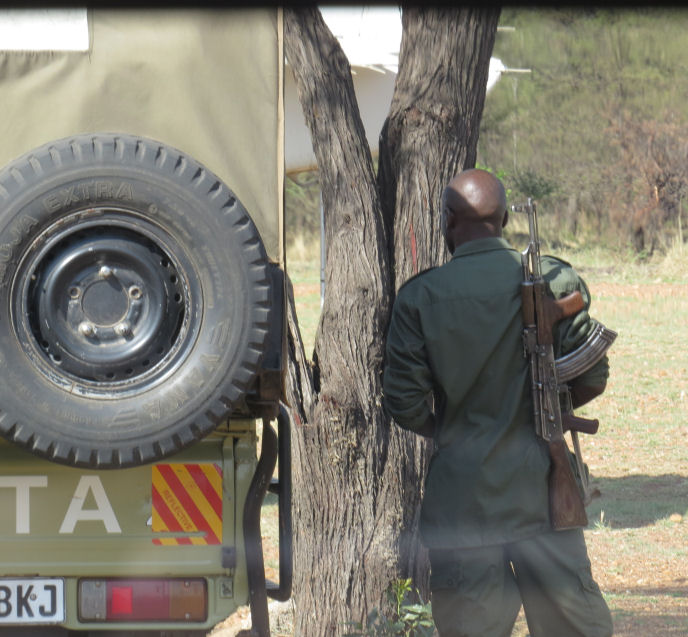
As it happened, the flight required only one hour, not two. We landed at about 10 a.m. on the Kogatende airstrip, which is just a clearing on the Savannah in the north end of Serengeti National Park. We disembarked and identified our luggage to the men from Alex Walker's Serengeti North Camp. They loaded our bags into one of their vehicles.
To our surprise, our guide, whose name was Baraka, informed us that we had time for a game drive before lunch. He introduced us to his partner, the tracker named Waili (sp.?), who sat beside him. This vehicle[3] only had doors for the front seat. We had to climb into the back two rows. This was not easy, to say the least, for Sue. A well-stocked cooler permanently resided between the seats in the second row. The back row seated three people.
Like Jackson, Baraka displayed a very good command of the English language. He told us that he had worked as a guide in the Serengeti for six years. Both he and Waili wore green Alex Walker wool sweaters, which seemed to me to be a strange choice of uniform for equatorial Africa.
We almost immediately saw a herd of wildebeests peacefully grazing. Baraka assured us that the wildebeests were still crossing the river. He also told us about their greatest nemesis, which is neither the lion nor the crocodile. Botfly larvae sometimes get implanted in the wildebeests very long nasal passages. Eventually they drive the poor critters crazy. Infected wildebeests have been known to jump off of cliffs to their deaths in great numbers.
The first bird that we saw was a grey-backed shrike. I managed to get a reasonably good photo of it.
The Mara River was not a long drive from the airport. We made our way there in hopes of viewing a crossing. Baraka explained that there were ten crossing points that were commonly used by the wildebeests. They are numbered 1-10 from west to east. The river never dries up, but it was not very deep when we were there. In some locations the wildebeests could walk across. At others they must swim a little. Near crossing #3 we spotted our first crocodile. Baraka explained that it was very easy to tell male from female crocodiles. The females were yellowish; the males were much darker.
Nearby we spotted an African fish eagle,[4] which, at the time seemed like quite a find. However, we saw quite a few of them at several of our stops. They were evidently quite common in sub-Saharan Africa.

Baraka received intelligence on his radio that a crossing was in progress at #2. We sped over there, but it was just ending by the time that we arrived. The animals had apparently crossed from north to south, but large numbers still remained on both shores, and several were calling out quite loudly.
Someone then reported that a crossing was in process at #3. We hastened back, just in time to see a very unusual sight. The wildebeests had started a crossing from north to south, but a hippopotamus picked that moment to amble[5] up the stream. This stopped the crossing. The wildebeests that had not yet crossed retreated up onto the northern plain, and the ones already in the water continued up onto the southern bank.
We parked in the shade and waited for more activity, but the wildebeests were too upset or confused by the actions of the hippo to undertake any further crossings. Once again we were treated to the mournful calls[6] of the wildebeests on both sides. We saw one wildebeest, apparently separated from its mother or its calf (the seven-month old calves are nearly as large as the mothers), crossed back from south to north.[7] While we were waiting, we also spotted a blue pansy butterfly there.
Eventually we all began to feel hungry and a little tired. We had been up for a long time, and watching and listening to the wildebeests had become tedious. On our way to camp we saw a few Thomson's gazelles.
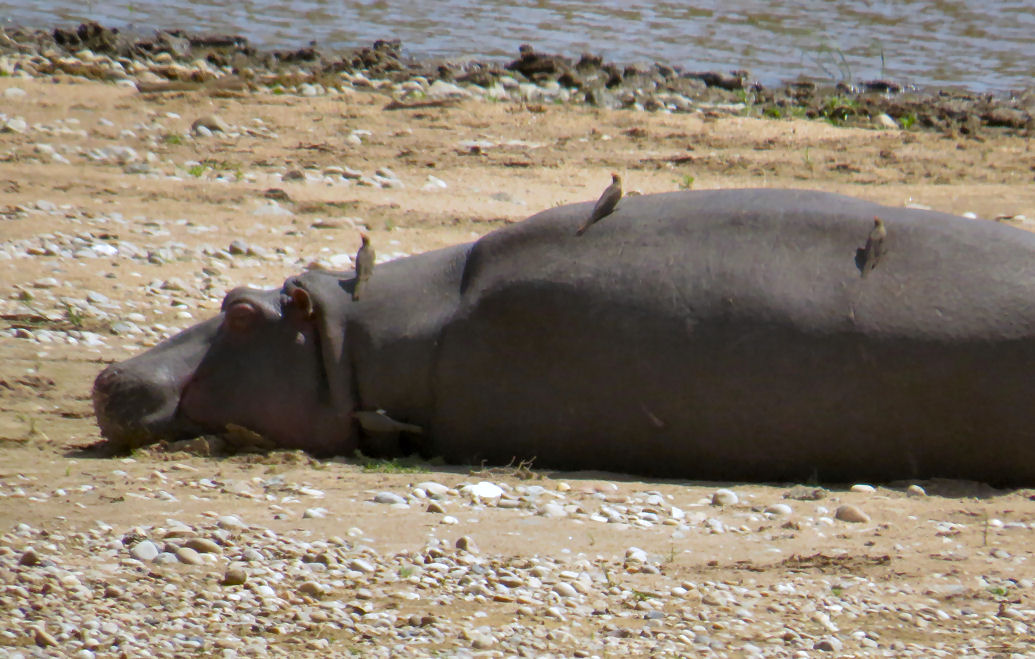
Baraka then directed our attention toward a stunning sight, a new-born zebra. It was on its feet, but it was obviously very unsteady. At one point it collapsed. It got back up and took a few steps toward a nearby tree. The mother, which was still covered with the afterbirth, paid little attention to what she had just delivered. Instead, her attention was drawn to consuming enough grasses to generate milk. We sat and watched them for at least fifteen minutes. By then the baby could move in specific directions, but it was apparent that she would need more time to summon the strength to walk over to where her mother was grazing.

At the last minute Baraka learned from other guides on the radio that a crossing appeared to be imminent. The Land Cruiser raced back to the river. We waited anxiously for a few minutes as the indecisive wildebeests on the other side of the river consulted with one another as to whether the grass was greener on the southern side. At last one brave soul splashed into the Mara, and the crossing was on. It was not a large crossing, but it was our first, and we relished it.
Baraka delivered a very happy group to the campsite, which is unique in the Serengeti. It is dismantled and moved twice a year so that it is in the best position for its visitors. It consists of seven or eight tents for tourists, a dining tent, a tent called "The Nest" that serves as a bar and gathering area, a cooking tent, and numerous tents occupied by the staff. We were greeted in the parking area by Belinda, our hostess. She directed us to the Nest, where we were given a drink and a short orientation. She then showed us to our tents. Ours was specially fitted with electricity so that Sue could use her CPAP machine. This allowed us to recharge our batteries, too. The others had to use the common charging station, which boasted multiple electrical outlets.
The tent was quite nice. It had a spacious main area that contained a very large bed, side tables with lamps, and a desk and chair. The bathroom was behind it, and it was also roomy. Along one wall of the latter were a flush toilet and a shower, which had their own light switch. There was also a basket for laundry, which I immediately filled with my clothes from the first few days.
I was not too pleased by two things. When I used the toilet, I was unpleasantly surprised to find that my condition had returned. Also, I felt a little woozy when I stood up afterward. I attributed this to the fact that the front of our tent was a little lower than the back, which meant that in the toilet room my right foot was lower than my left.
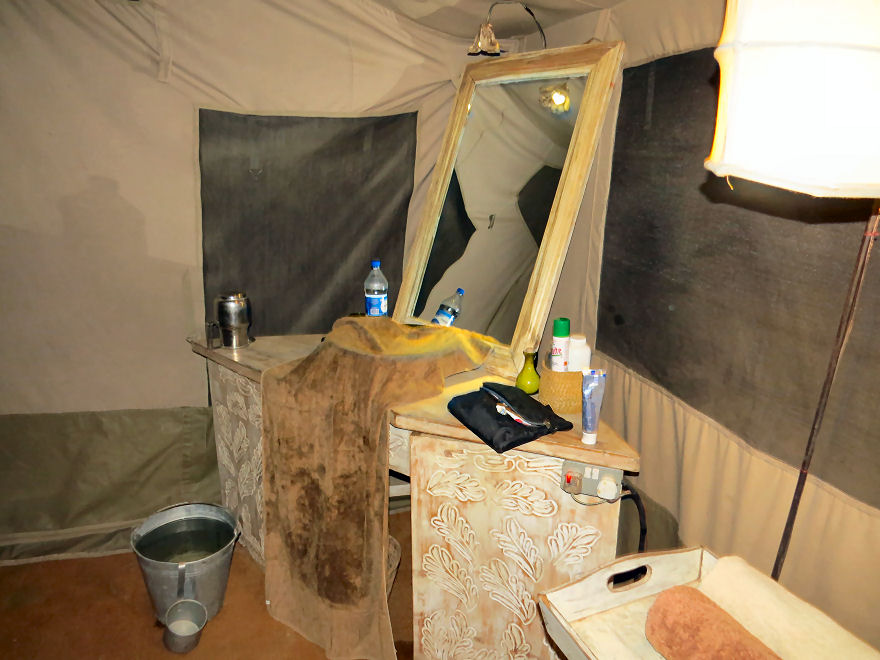
After we unpacked a little we walked to the dining tent for lunch. It was a rather casual affair, but there was one celebrity guest, Alex Walker, the owner of this camp and several others in Kenya and Tanzania. Unfortunately we were seated on the other side of the very large table, so we did not get to sample his wisdom. There appeared to be eight other guests in camp that day, four from Houston, two from Virginia, and two from Minnesota. The last couple had arrived on that very day.
I was wary of any food. I did not write down what I ate, but I remember quite vividly that I avoided anything that might incite a revolution within me. I particularly avoided salads because I feared that they might be washed with tap water.
After lunch we retired to our tents, finished unpacking, and took a little snooze. This was the usual schedule in Africa. Get up early, work until lunch, eat, take a nap, and then go back to work in the late afternoon, about 4:00.
Sue decided to extend her siesta. She skipped the afternoon game drive. Instead, she stayed in the camp, arranged her stuff, explored the camp, and relaxed.
My notes say that Baraka identified some African wattle trees to us. I don't remember anything about this. I might have been mixed up about this. Some birds that we saw have "wattled" in their names.
We saw a group of vultures. Baraka explained that there is a definite pecking order for the scavengers. The mammals with powerful jaws like hyenas and jackals usually get the first shot just because they can rip apart the carcass and make it easier for the others. Then come the vultures with strong beaks, and so on down to the ones that bring only their appetites. Baraka listed all of the scavengers in order, but I failed to write them down.
We were headed for the other side of the river to look for cats. Along the way we encountered a large group of elephants and some giraffes. Two days earlier these would have been heart-stopping events. We still stopped to watch them, but not for long.
Baraka guided the Land Cruiser across the Mara River on a one-lane concrete bridge. The drive was fairly exciting because the current was obviously pretty strong there. The same question occurred to all of us: Why don't the wildebeests just use the bridge to cross in a safe and orderly manner. The answer, according to Baraka, was that they had no memory of ever using the bridge. They did remember their previous ten crossing points, and so they continued to use them year after year. No wildebeest has ever won a Nobel Prize.
Nevertheless, we came to appreciate that the wildebeests' survival strategy seemed to be among the most successful of all of the large African animals. The one-year survival rate of the newborns is one of the highest, and the population seems to be thriving. They are without a doubt the most numerous of the ungulates. They are not doing it on looks or brains. They must have good instincts, or maybe just luck.
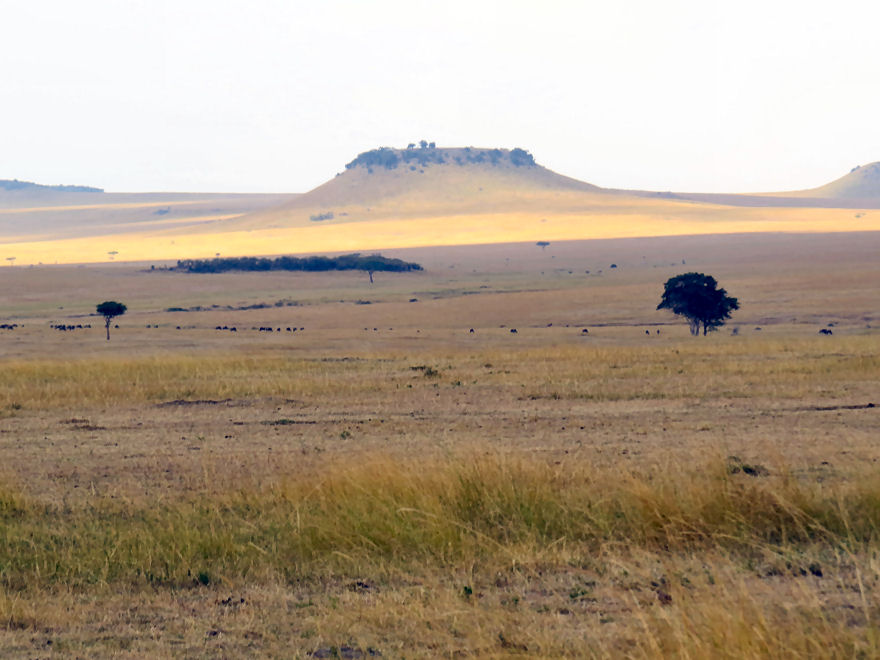
I mistakenly thought that the river was the border between Kenya and Tanzania. In fact, however, both sides of the Mara River were in Tanzania. The border was, however only a short distance to the north. We saw a marker for it.
On the other side of the river were some flat hills in the distance. In the American west they would be called buttes. We never got very close to them; they might have been in Kenya.
We felt a few drops of rain; nothing came of it. It did cool things off a little.
Baraka identified a large antelope as a topi, the first that we had seen.
We chanced upon two male cheetahs lounging in the savanna. One was in the sun; one had found a shady place to relax. They moved around a little while we were watching, but they refused to put on much of a show. We did not care; we were just happy to be able to say that we saw some cheetahs in the wild before they became extinct.
We stopped for a few minutes to observe three young lions. Shortly thereafter three jackals popped into view.
My notes say that we saw a sandgrouse. I do not remember it, and I did not note the species.
We saw a business (yes, that is what a group is called) of banded mongooses (not mongeese) around an abandoned termite mound. They all scattered and scampered away before I could snap even one photo of them. It was rapidly becoming apparent that the only viable strategy on game drives in the Serengeti was to bring plenty of batteries and leave your camera on 100 percent of the time.
As we watched a group of elephants, Baraka told us that they could live sixty years. Their gestation period is two years.[8] Elephants can eat up to three hundred pounds of food in one day.
Baraka told us that the candelabra trees that were so prevalent in the Ngorongoro Crater are poisonous to humans. Nevertheless, the rhinos love to eat them.
I got some pretty good photos of the sunset. Just as we drove into camp, we heard a distinctive bird call. Baraka immediately said "I know that bird!" He buried his head in his hand for about fifteen seconds before announcing "Rattling cisticola!" None of us was about to challenge him on it. You can listen to one here.
Baraka consulted with us as to whether we wanted to leave early the next morning to try to see a crossing and to eat a "bush breakfast." The alternative was to eat breakfast in the camp and leave later. We all voted for the bush breakfast.
You have to order a bucket shower a few minutes in advance. The guides ordinarily do this for you near the conclusion of the afternoon game drives.[9] The camp staff somehow heats up enough water for a shower and fills the container outside of your tent. The staff person who does this then announces that the shower is ready. This worked pretty well unless you dawdled and let the water get cold. For all of my showers in this camp the temperature of the water was perfect, and the flow, which was regulated by an overhead lever, was quite good.
As usual, we were a little late getting to the campfire that always preceded supper at the camp. I met Mark from Houston, who admitted that he had been very reluctant to go on safari. It was, he said, his wife's idea. Nevertheless, he said that he had had a great time. This was their last night.
Chris, the lady from Minnesota, reported that they had witnessed a very large crossing that had gone horribly wrong. Evidently a bottleneck appeared on the destination shore, and a large number of wildebeests — one hundred or more — were trampled and drowned. She said that she had to turn away from this very ugly scene.
At supper I sat near the other couple from Houston. Ken was evidently a hunter. He talked about going on hunting trips with his buddies in Mexico and Argentina. He said that he had shot 3,000 doves in Argentina in one day. All that I could think of was that it was a good thing that Betty, an ardent conservationist, was sitting at the other end of the table.
After supper I was feeling pretty good. I let Ken talk me into sampling a glass of Amarula, a very popular South African liqueur. It tasted quite good, but it made me more than a little tipsy.[10] Maybe I should have passed.
When I used the toilet after supper, I definitely felt queasy. The slope of the wooden floor bothered me even more than before. I did not get sick, however, and I did remember to take both the Malarone and Cipro pills.
As soon as I got in bed I immediately fell asleep. The bed was large and very comfortable. In 2015 staying in a safari camp does not necessarily entailed forgoing creature comforts, except for those that required electricity or Internet access.
I cannot remember ever packing so many memorable moments into one day.
[1] Africa Odyssey recommended tips of $10 per person per day for the staff and $15 per day for guide/drivers. That meant that the five of us would be, if we followed the guidelines, tipping $125 per day. We actually exceeded that amount. To put this in perspective, the average annual income in Tanzania in 2013 was $927.10.
[2] Gerard at the Serian Camp in Serengeti later informed me that the security machines at the Lake Manyara Airport do not actually work.
[3] The luggage was transported to the camp in a separate vehicle.
[4] My recollection is that everyone called them "fisher eagles."
[5] Hippos are not great swimmers. They generally walk on the bottom of rivers. The Mara at this point was shallow enough that the hippo's eyes and nose were visible throughout.
[6] The wildebeest has been endowed with equal portions of intelligence, beauty, and musical talent.
[7] The flow of the migration in September is from south to north. However, there are also numerous crossings back from the north to the south. In fact we saw more animals cross in that direction than from south to north.
